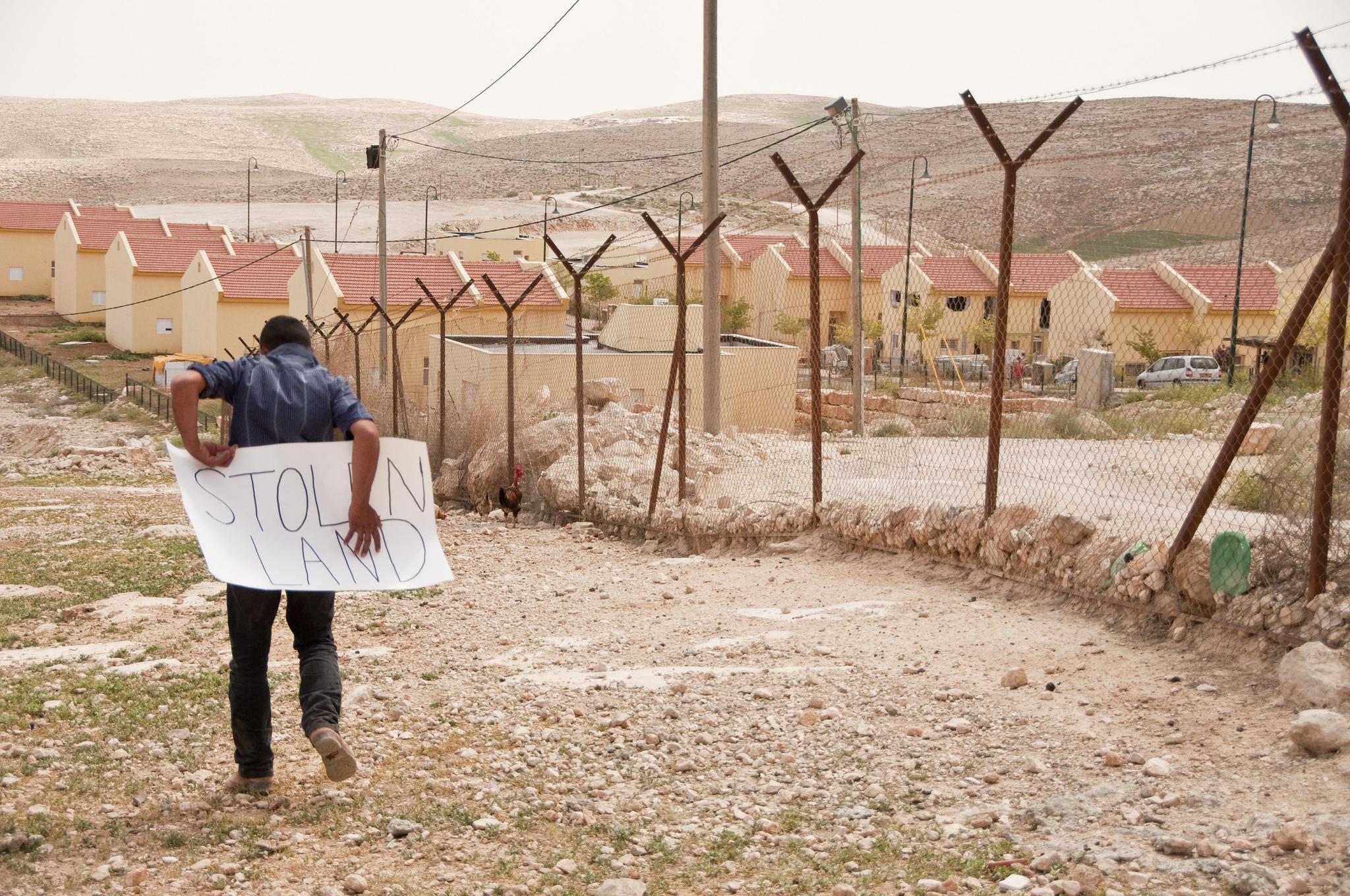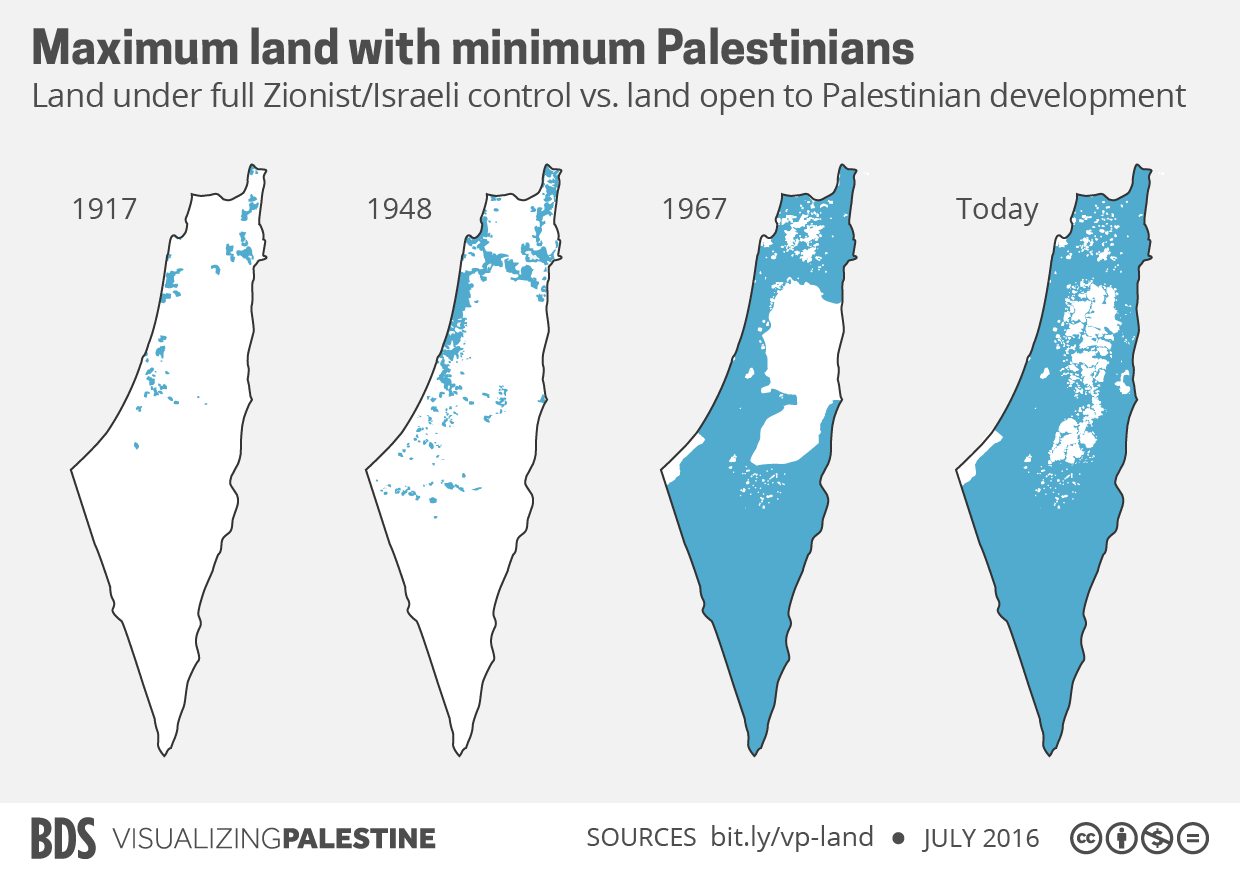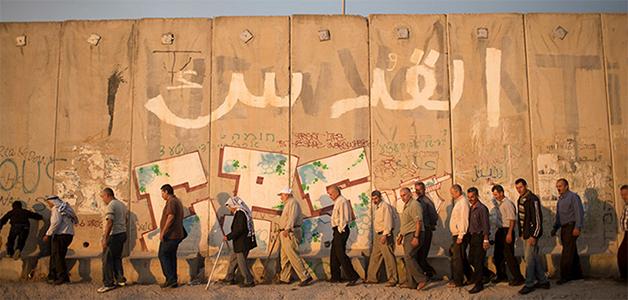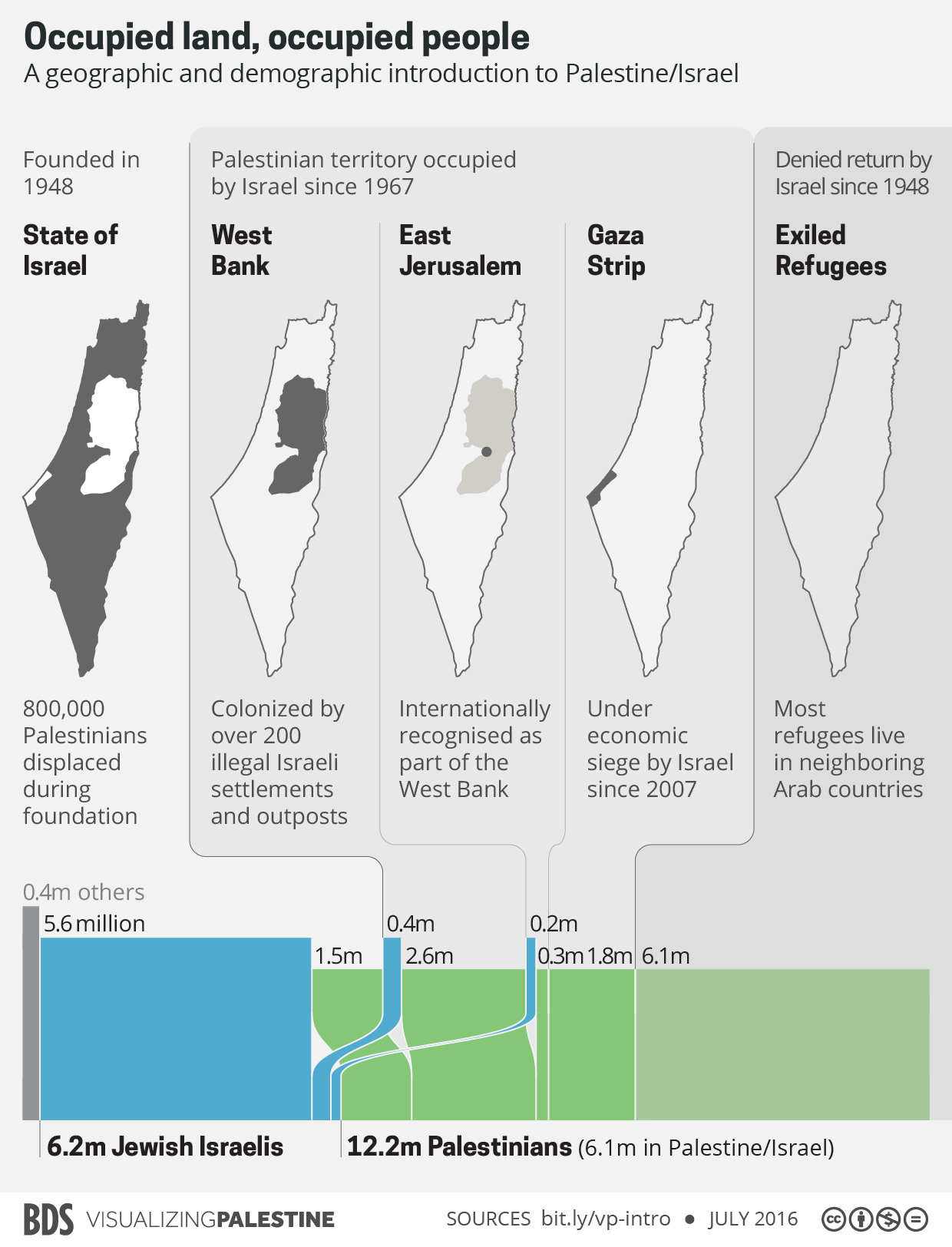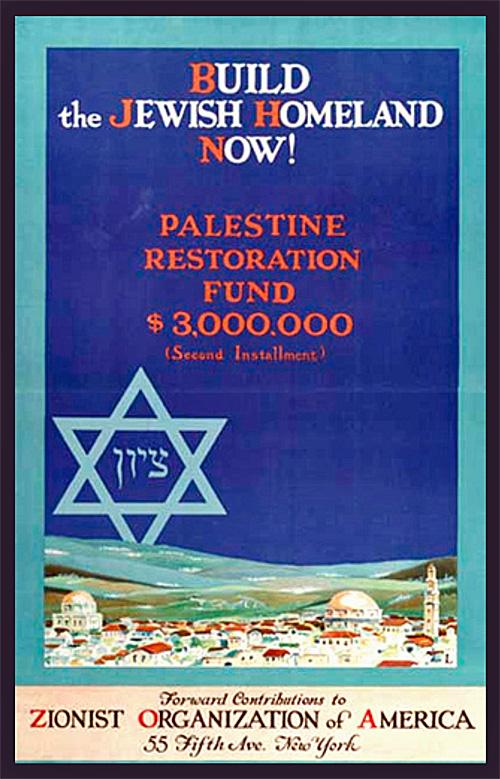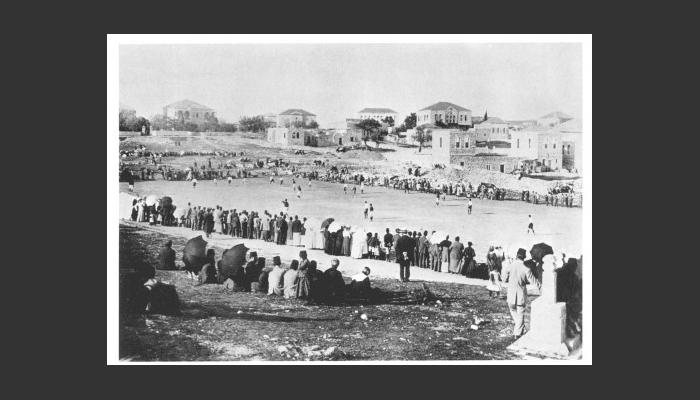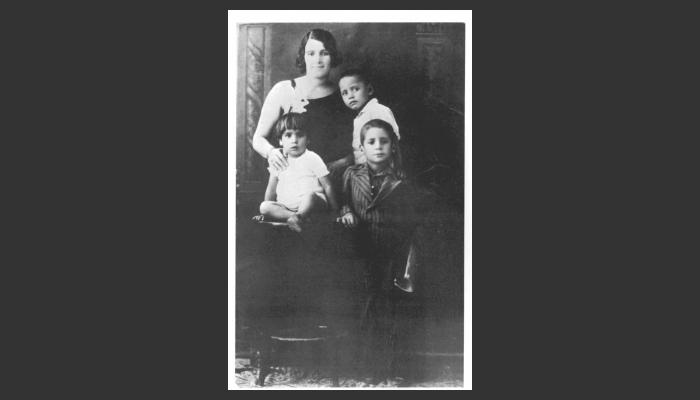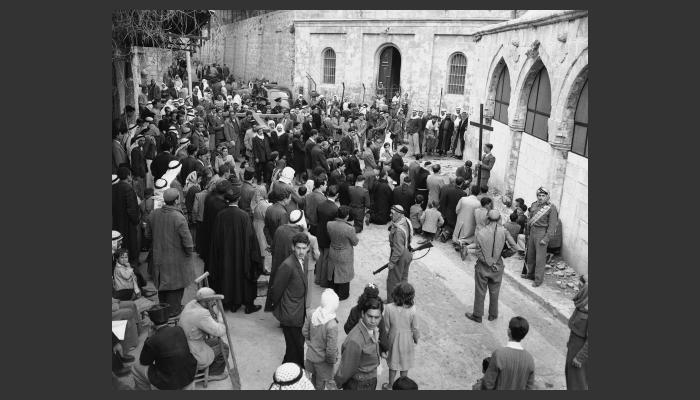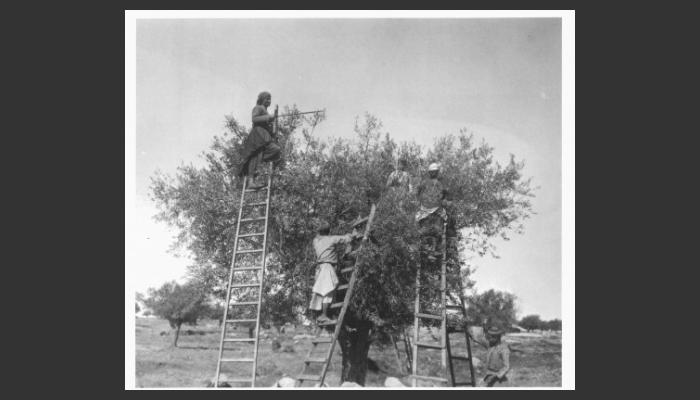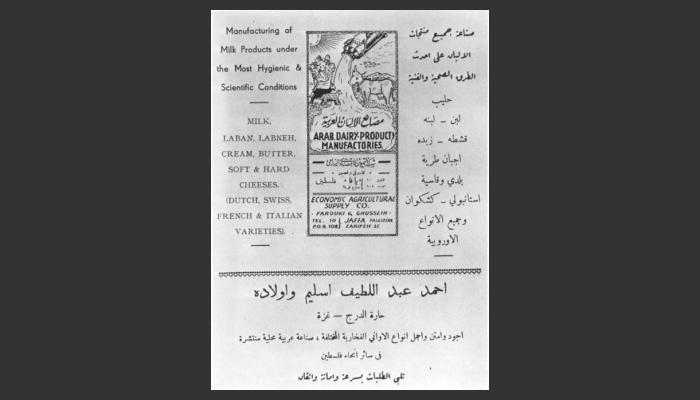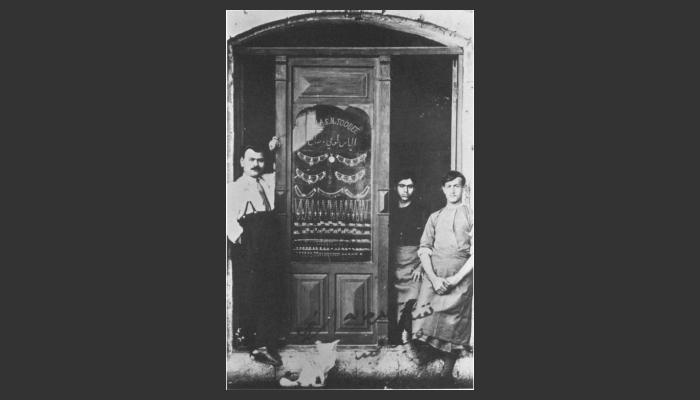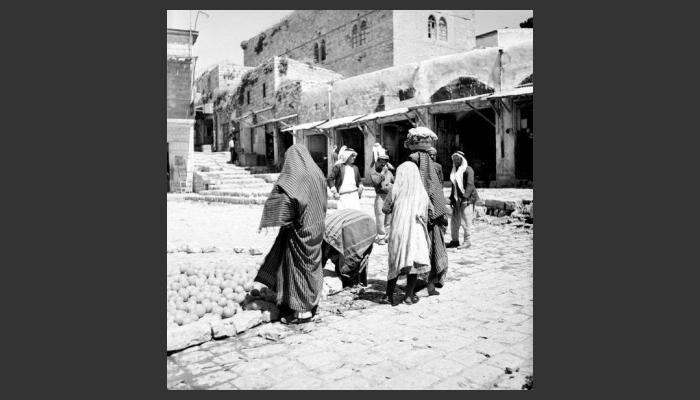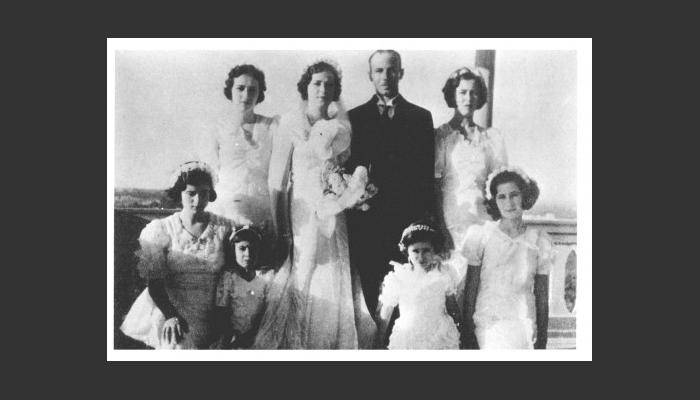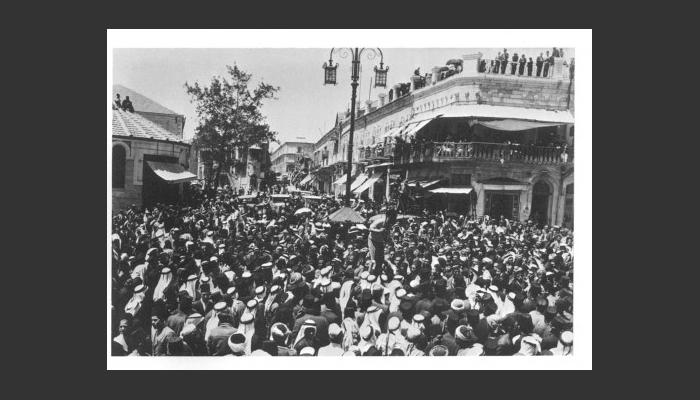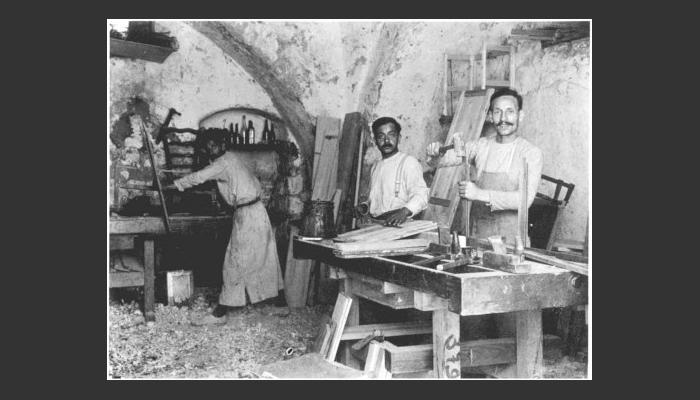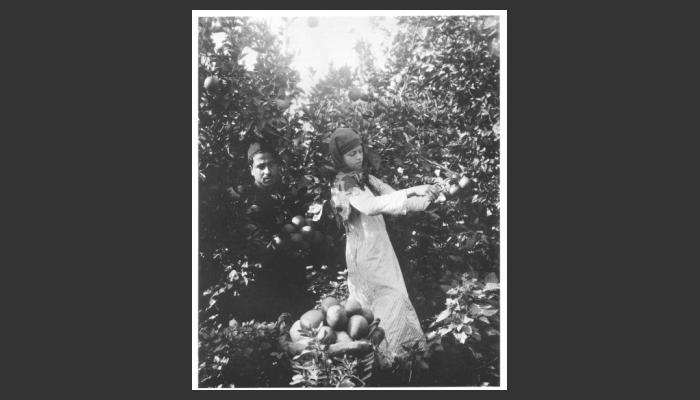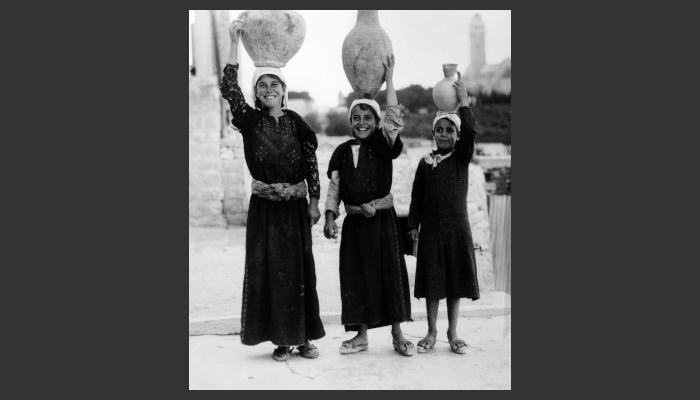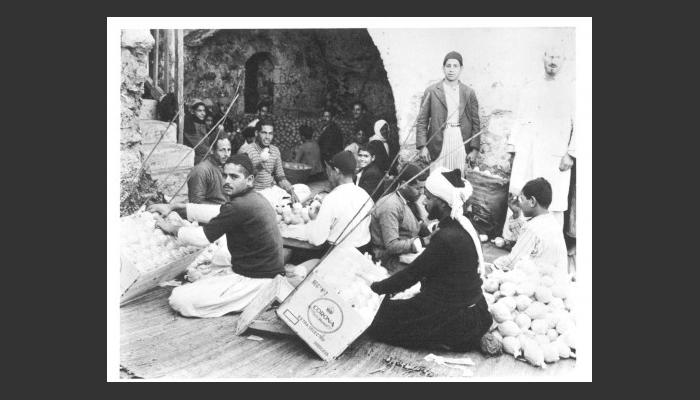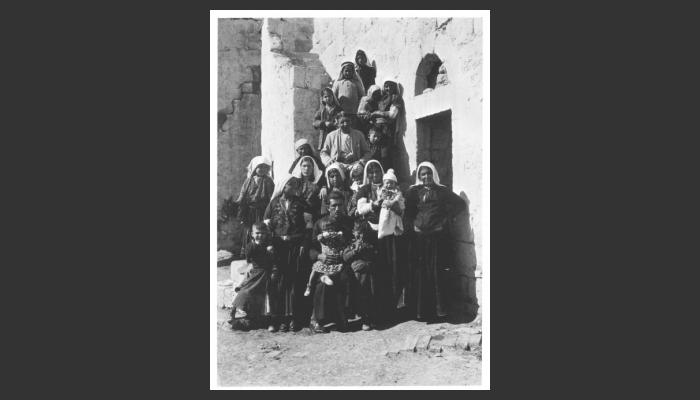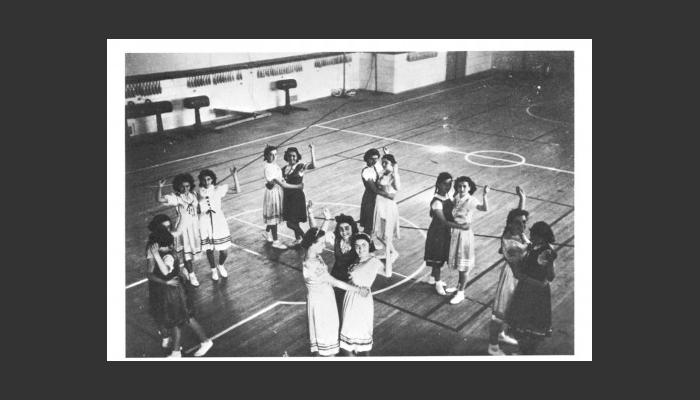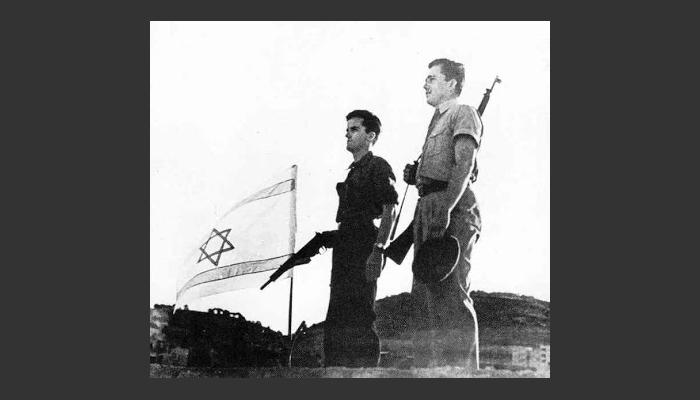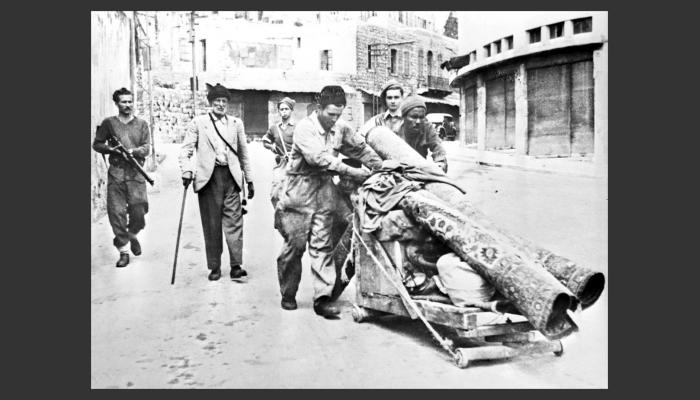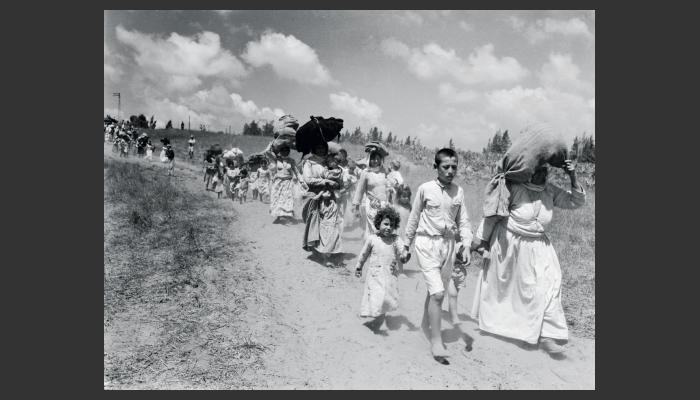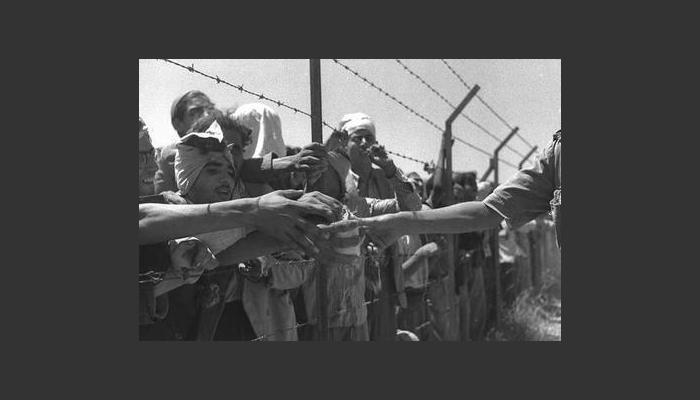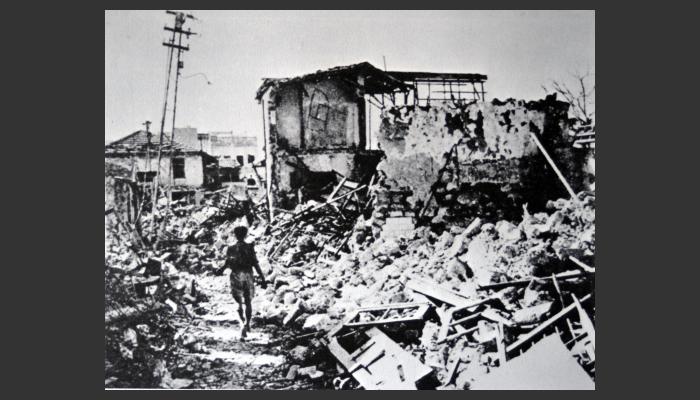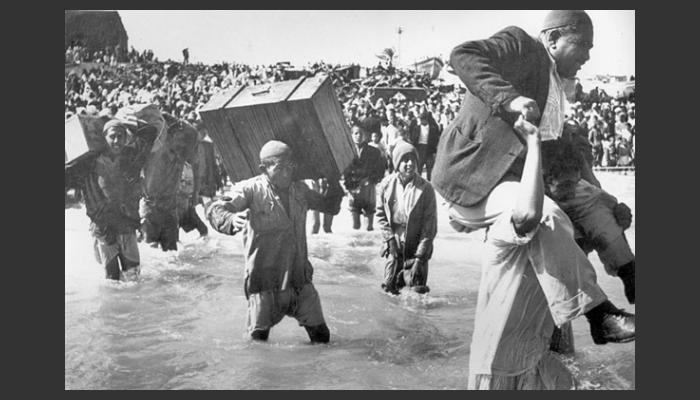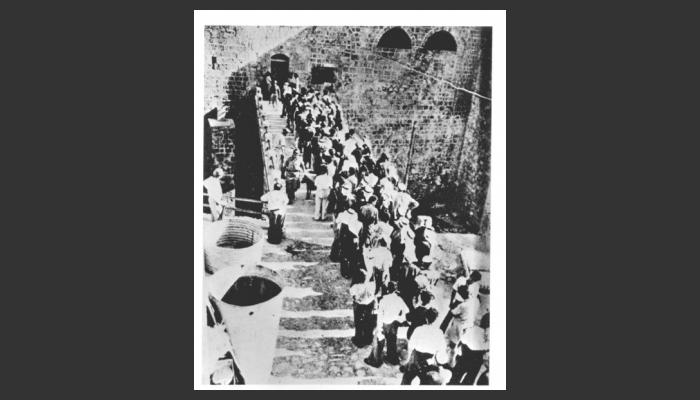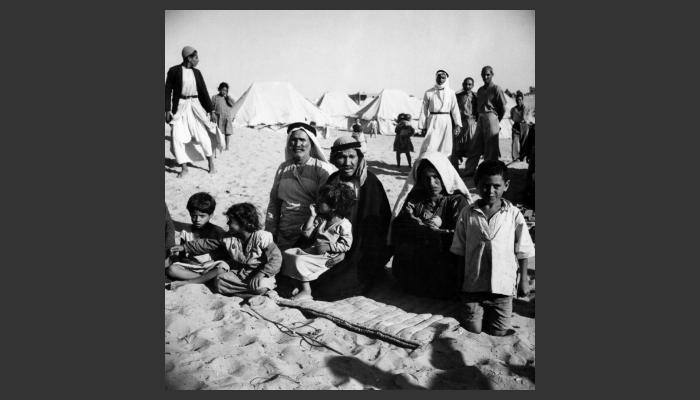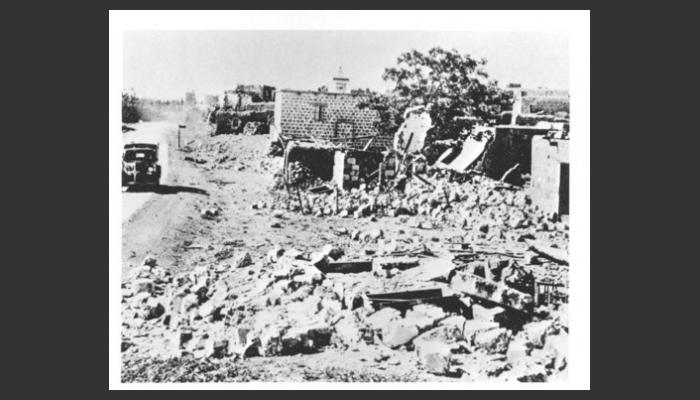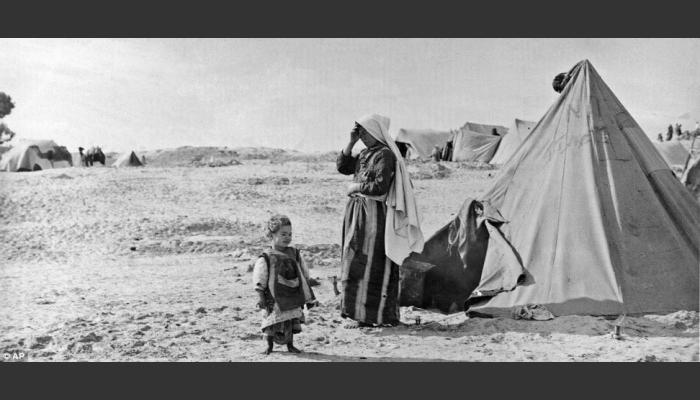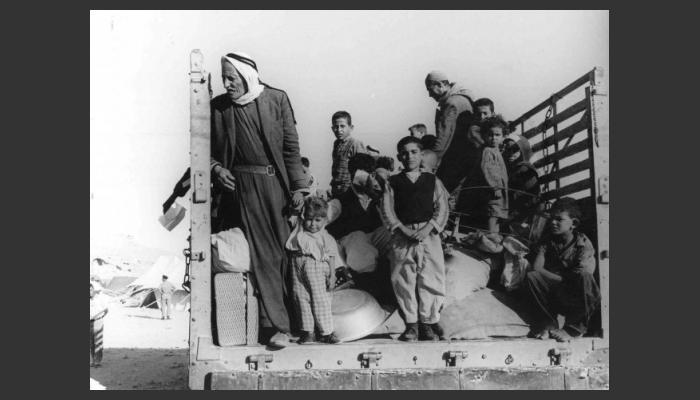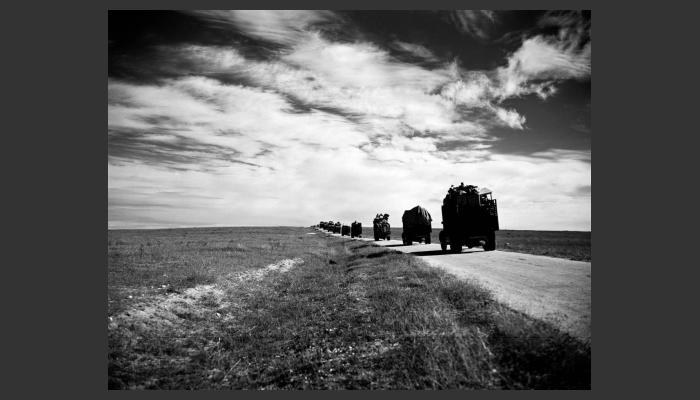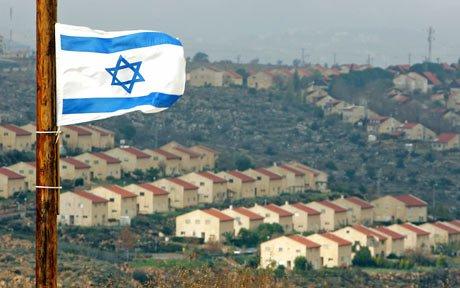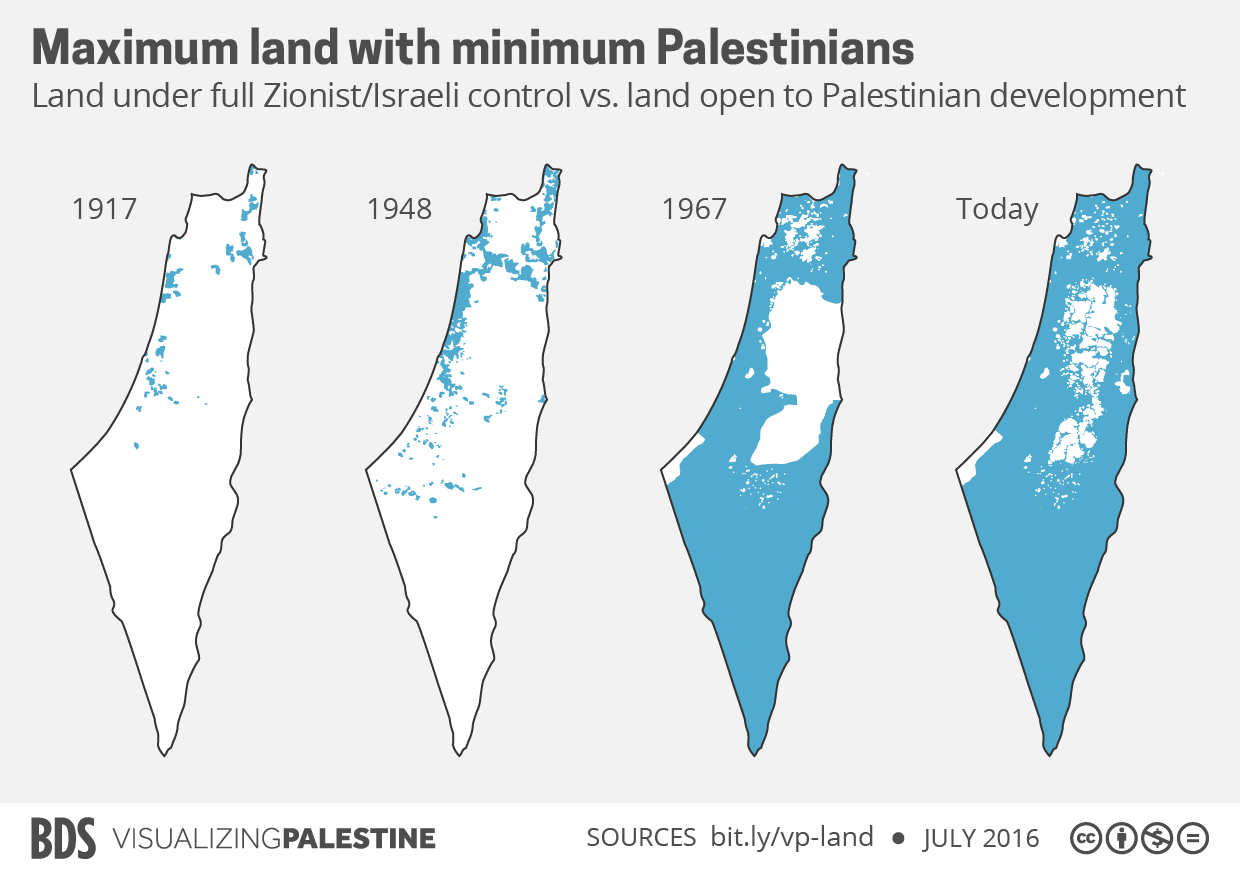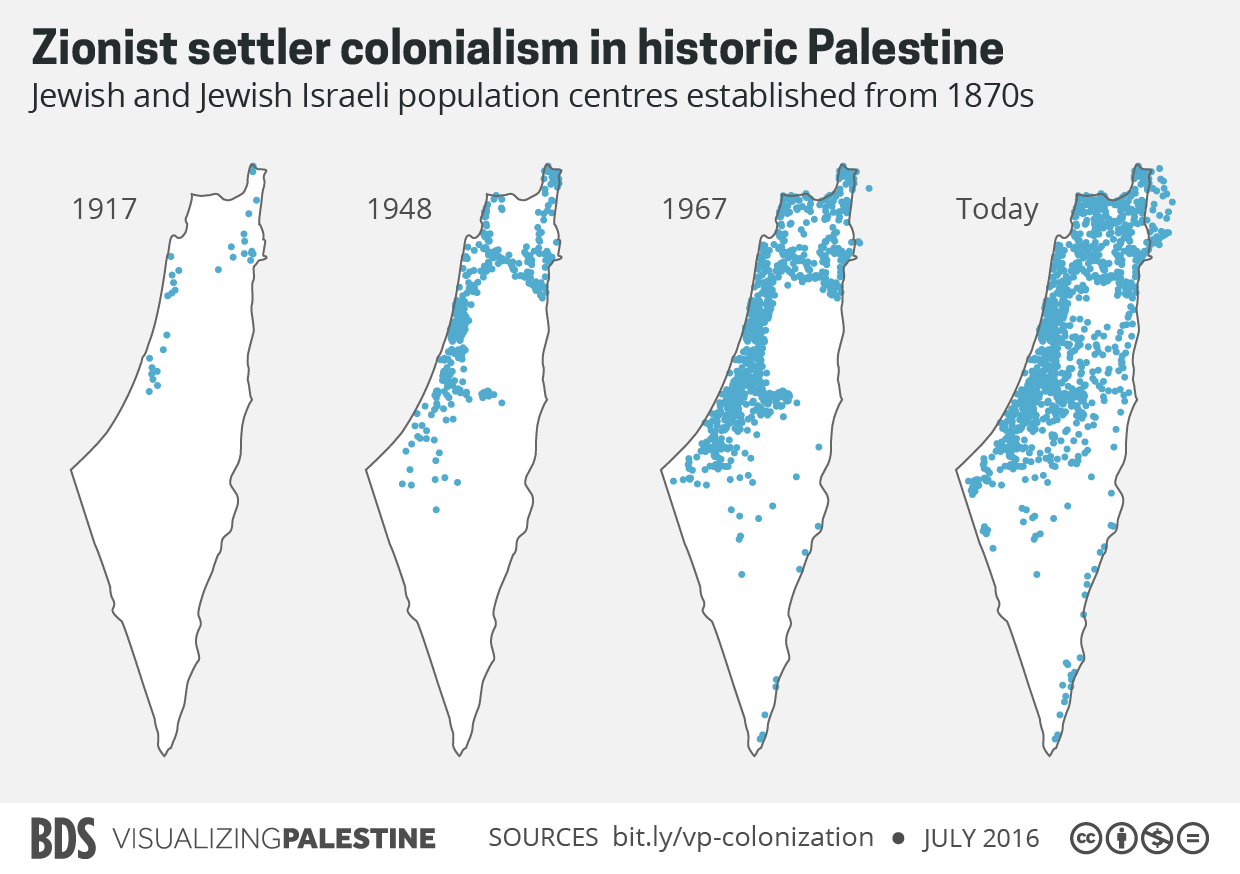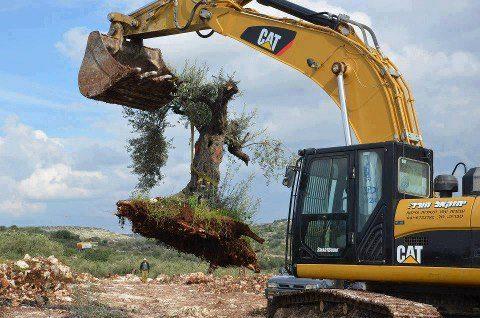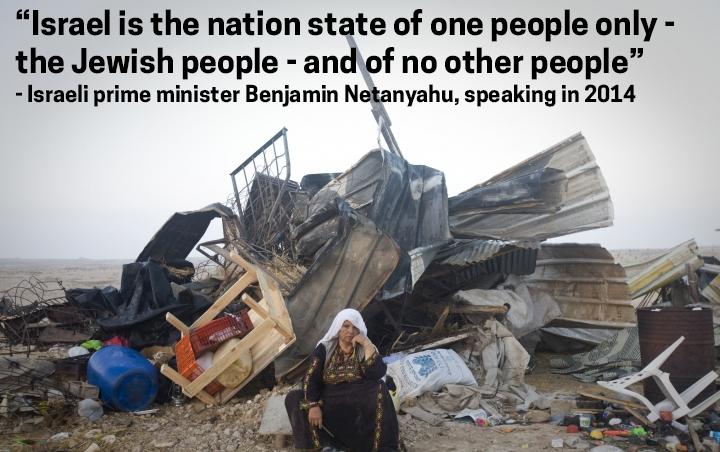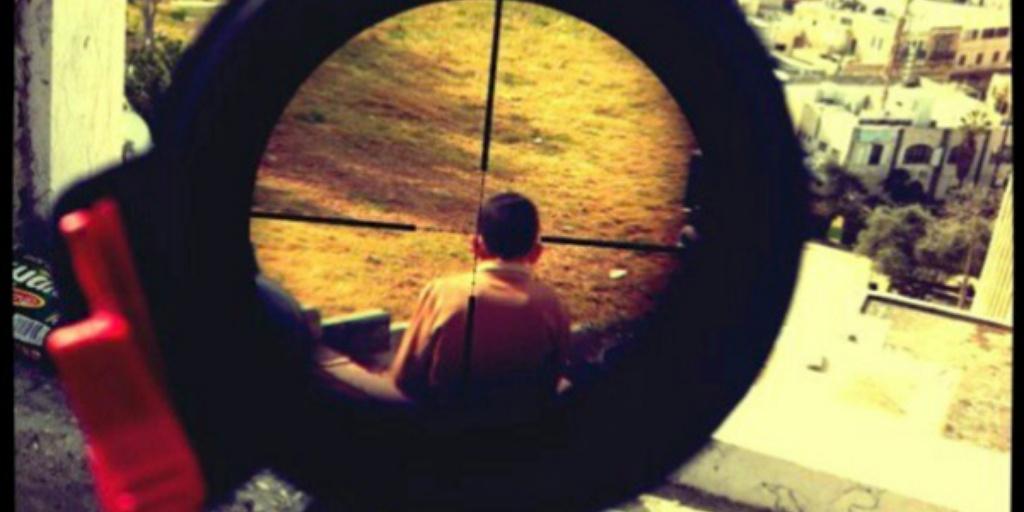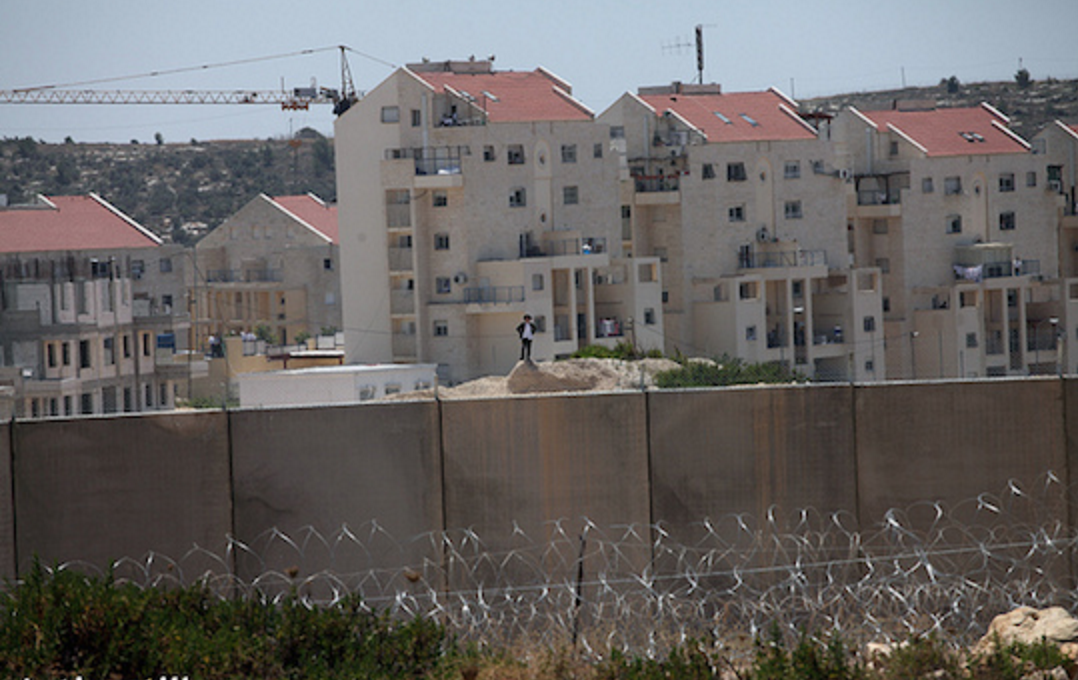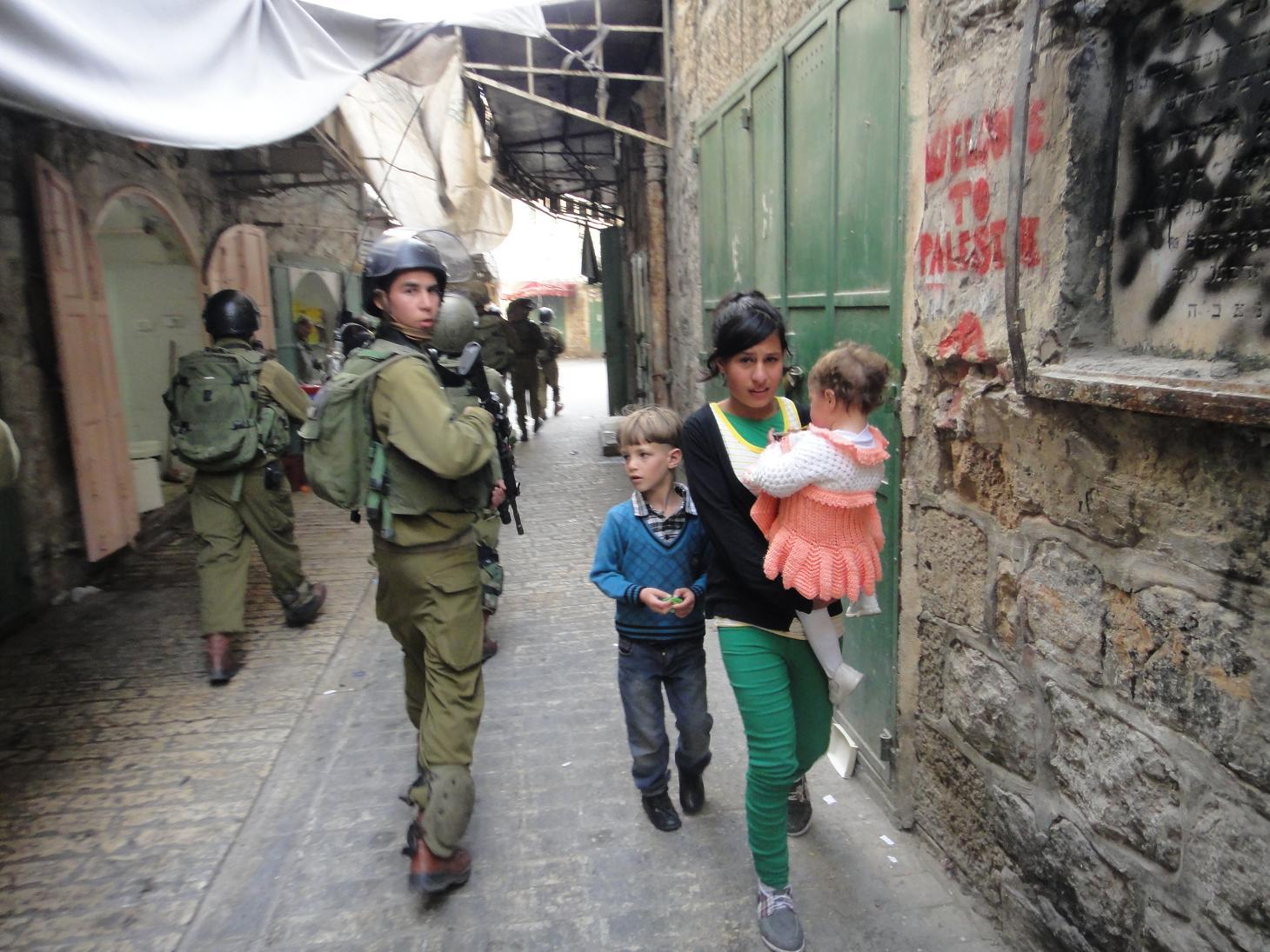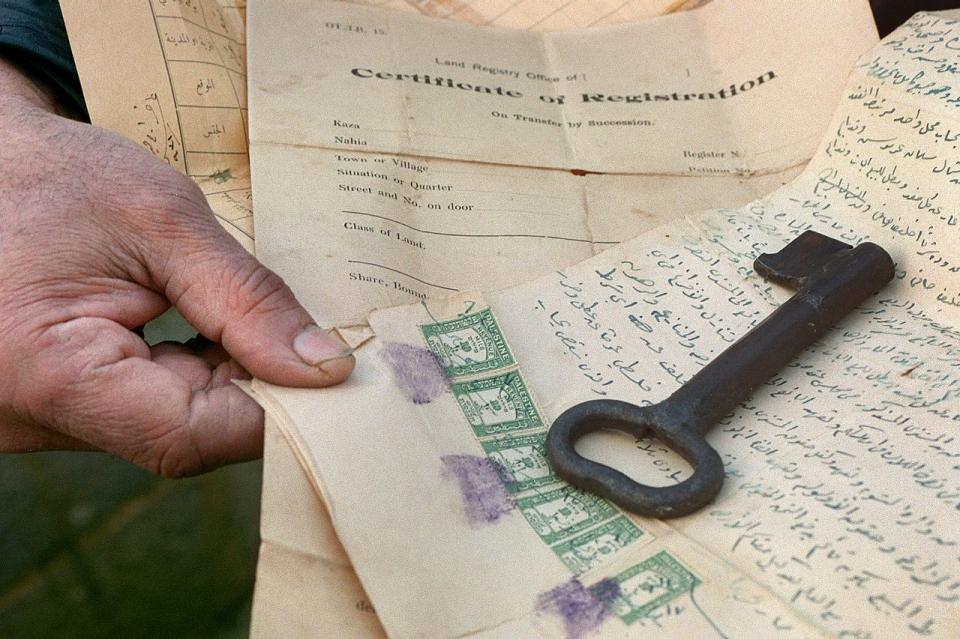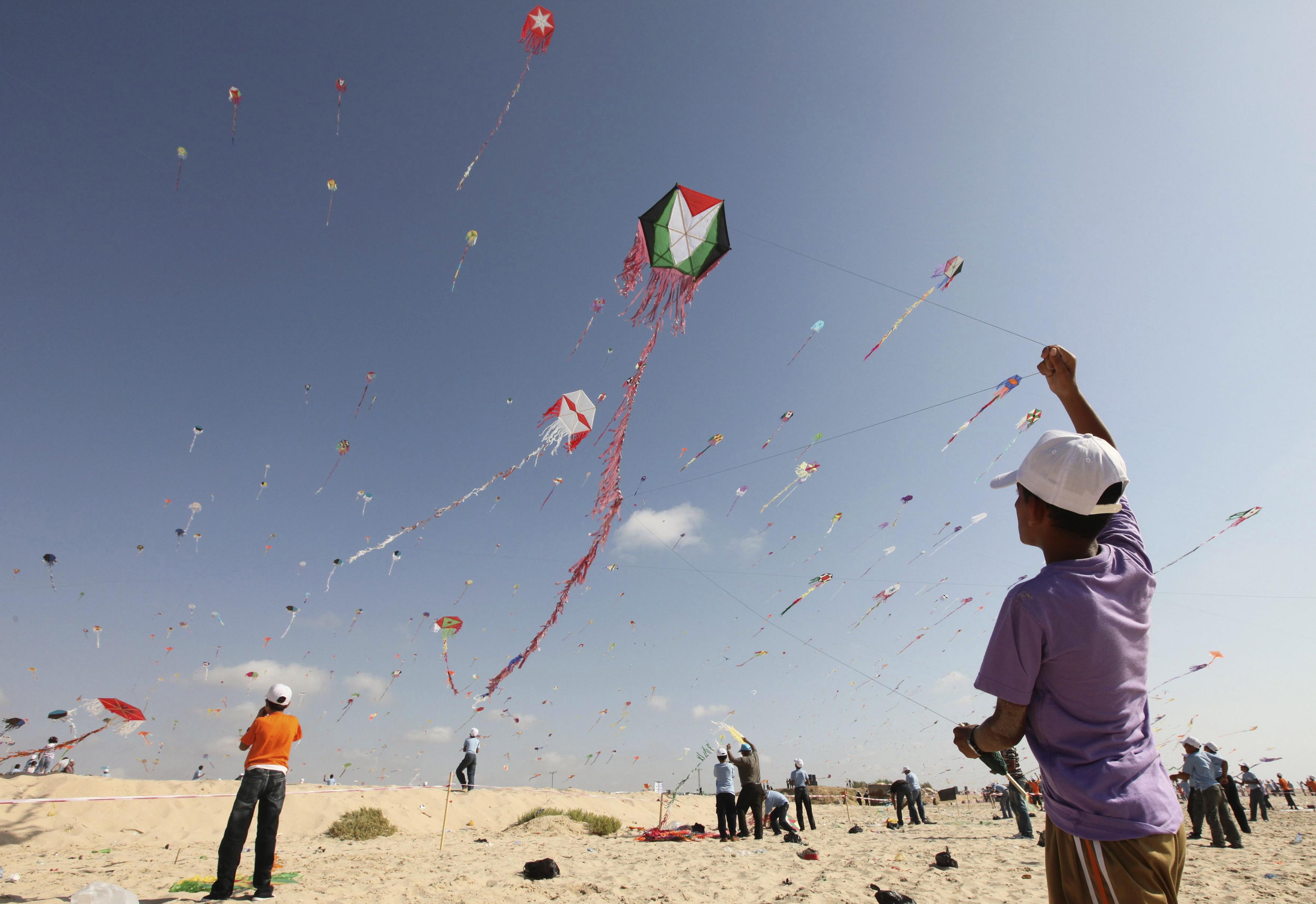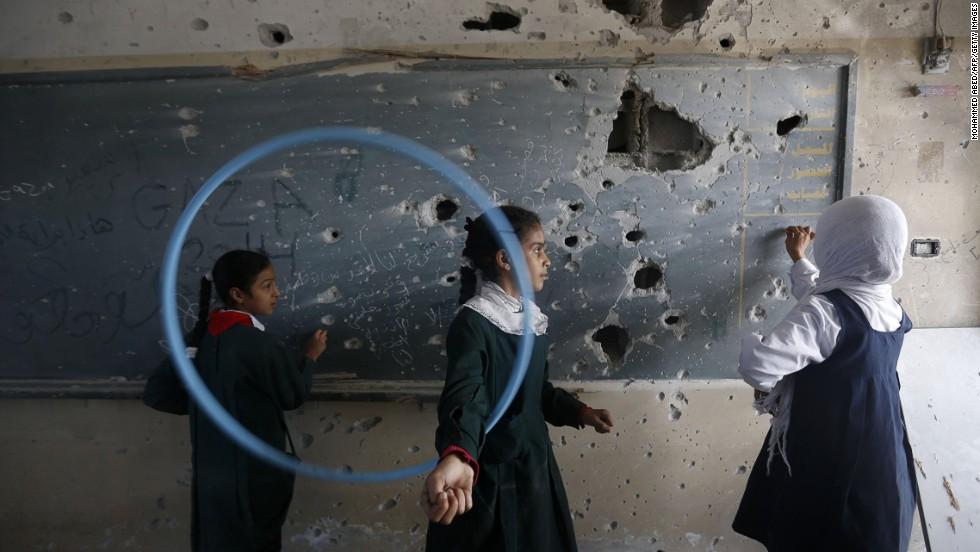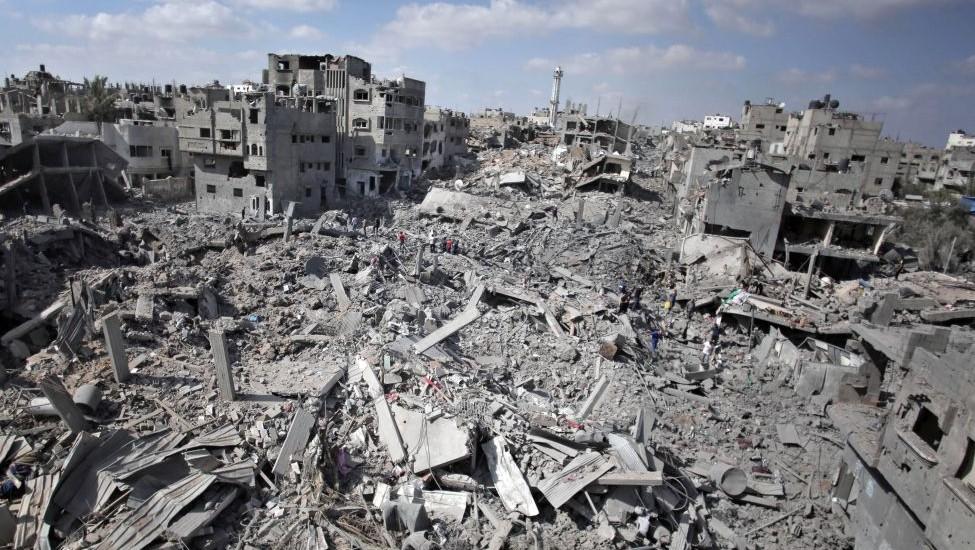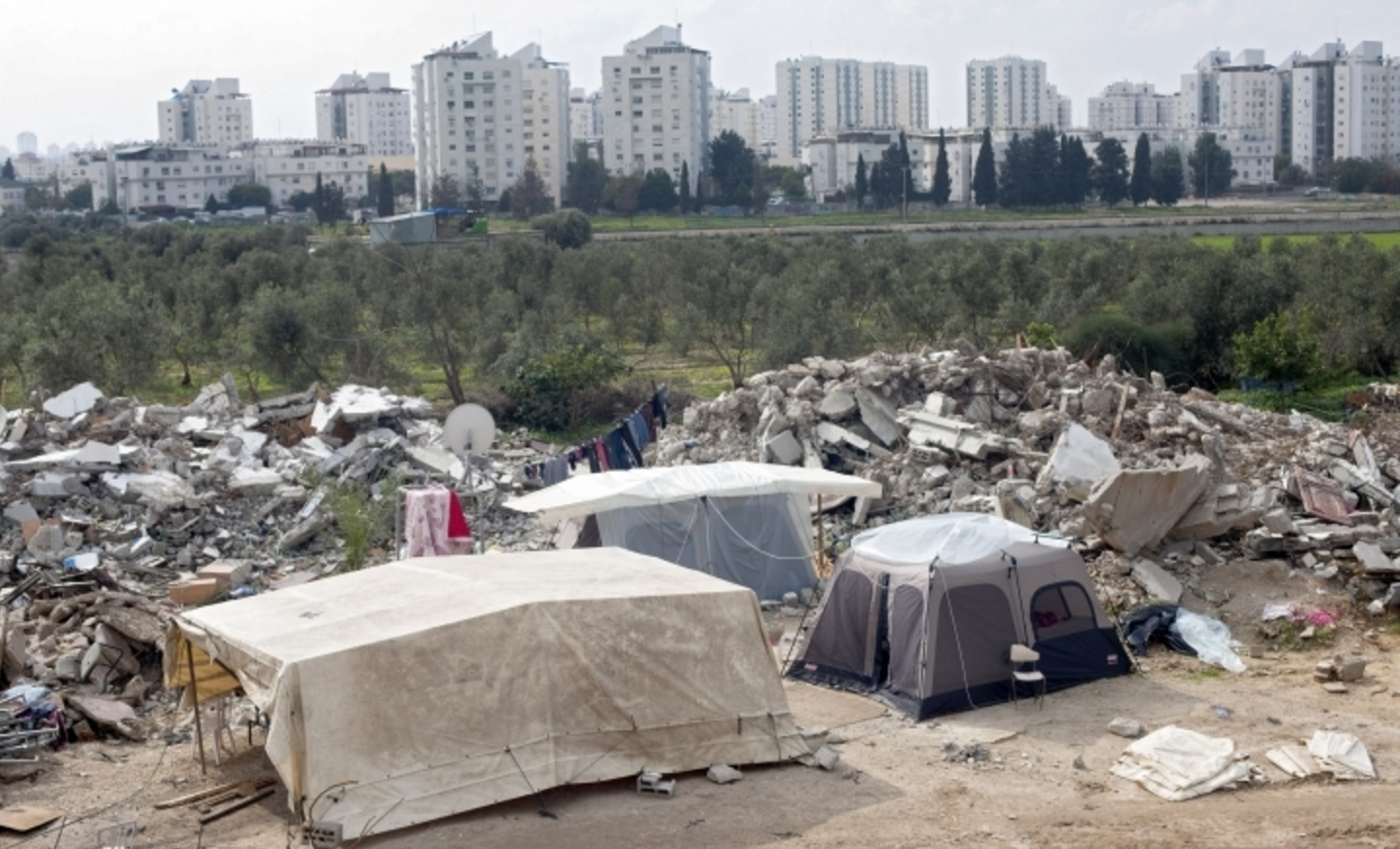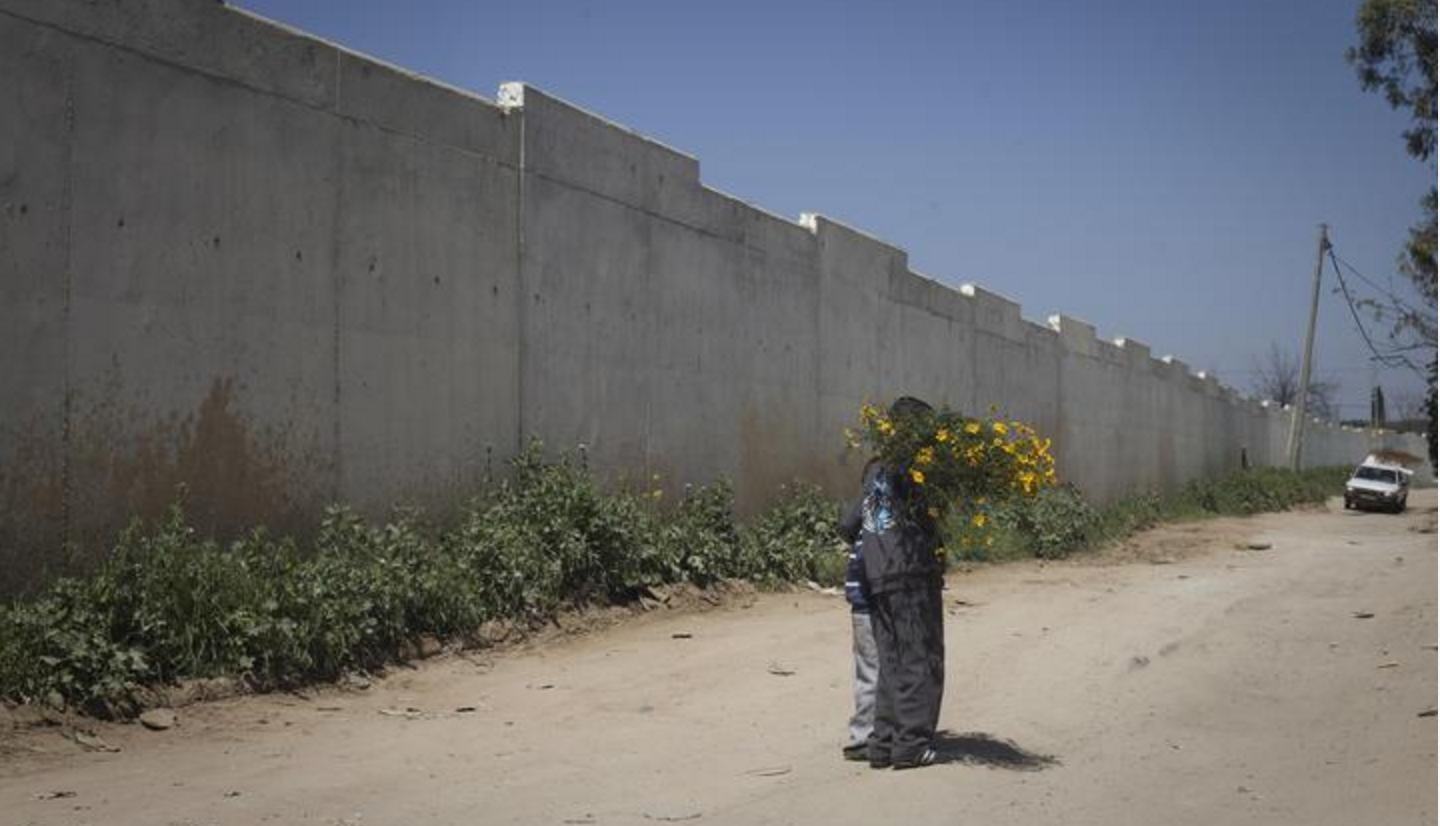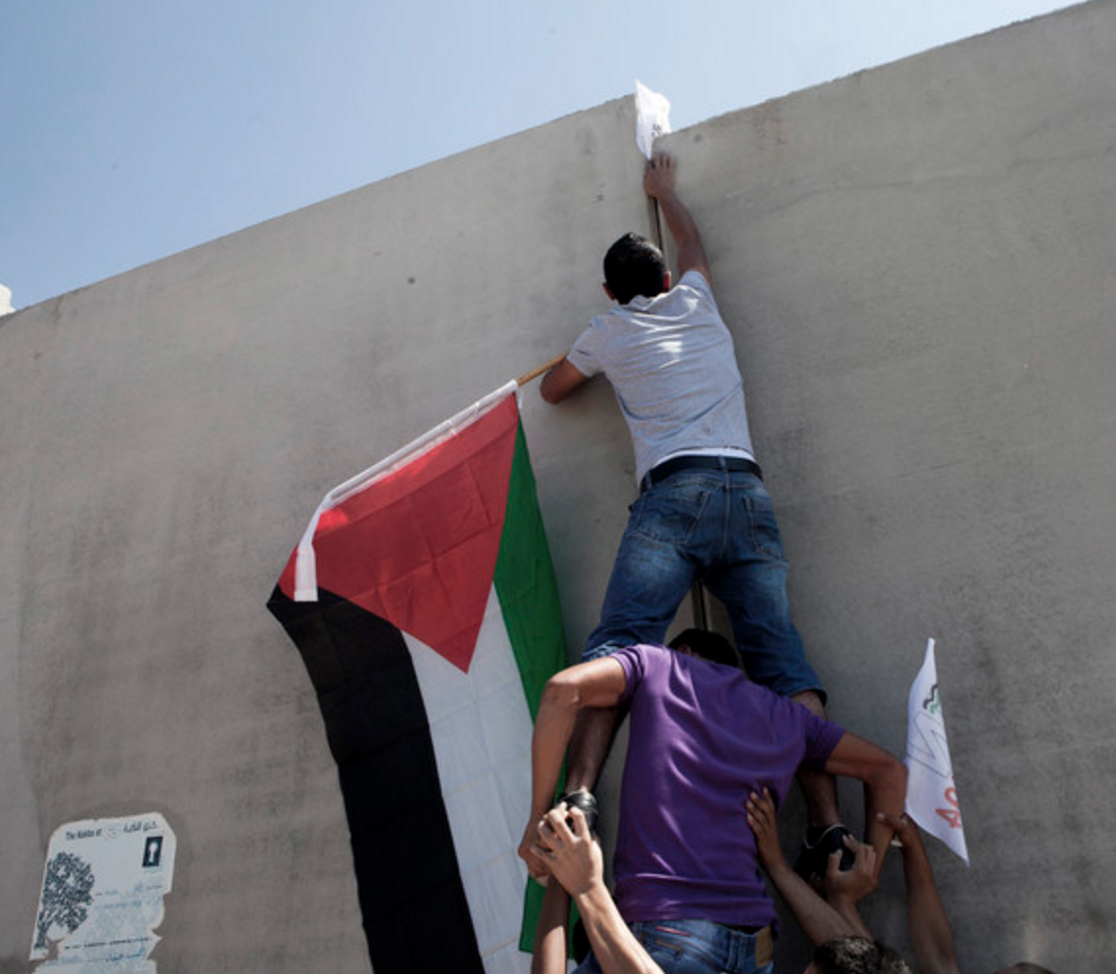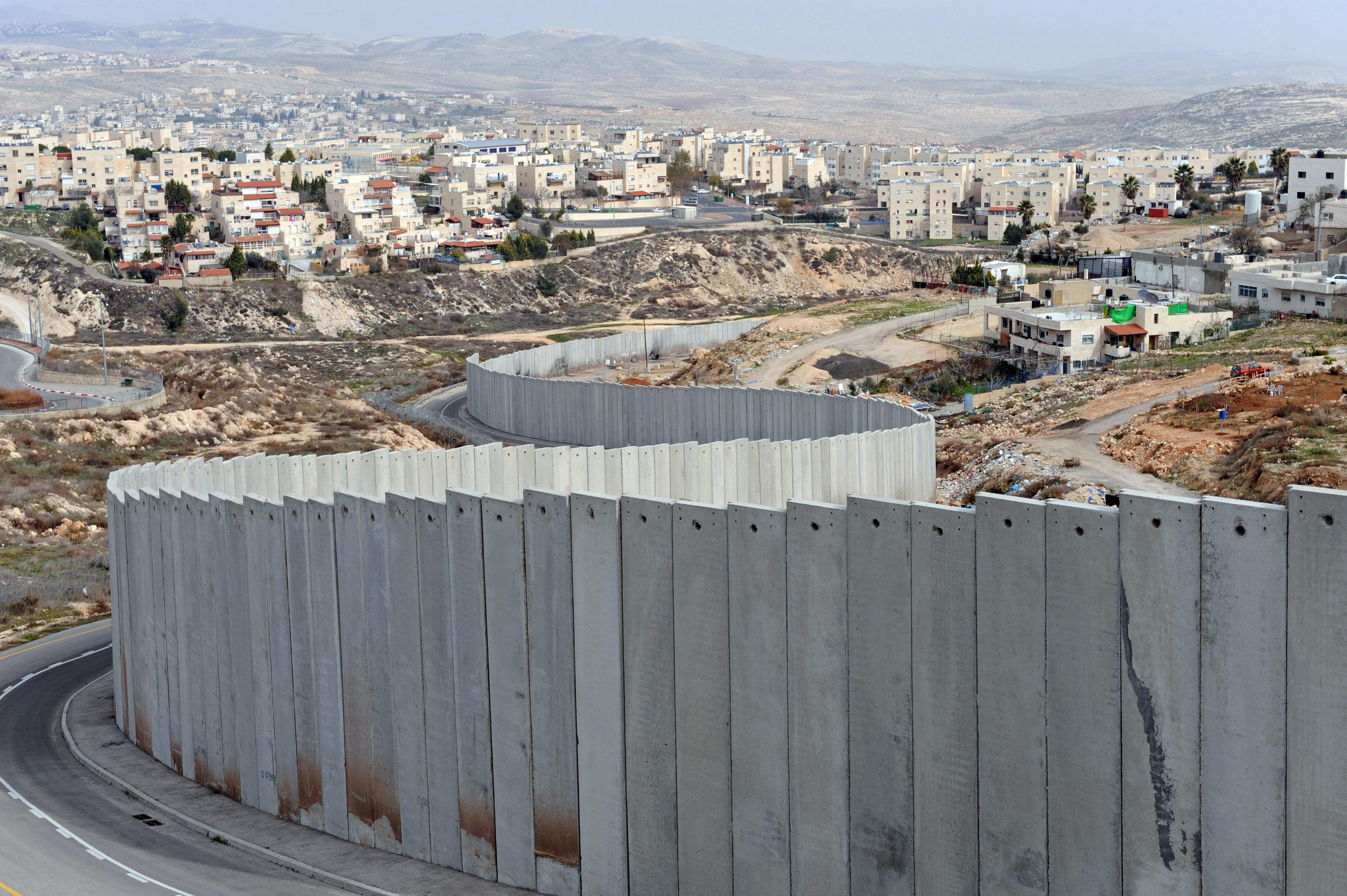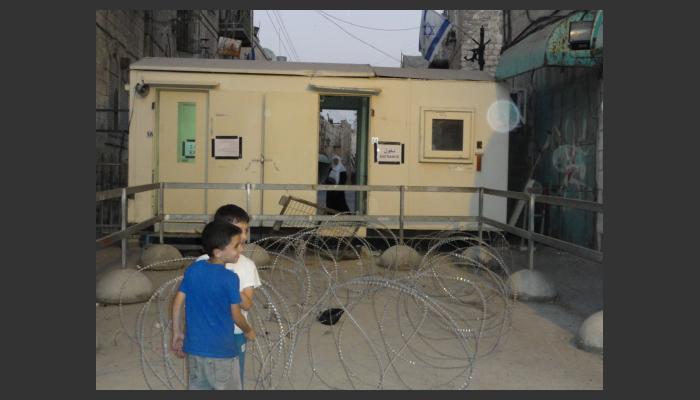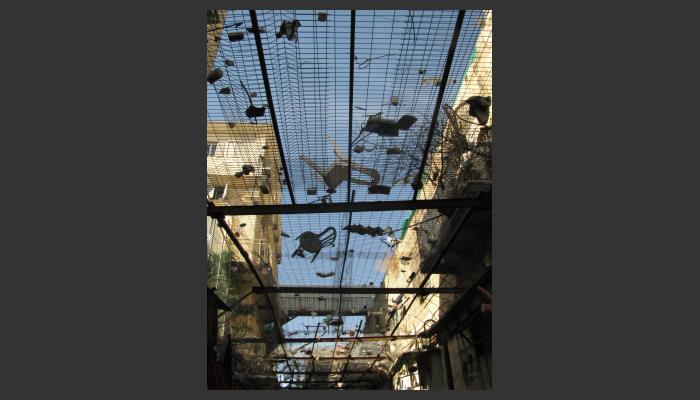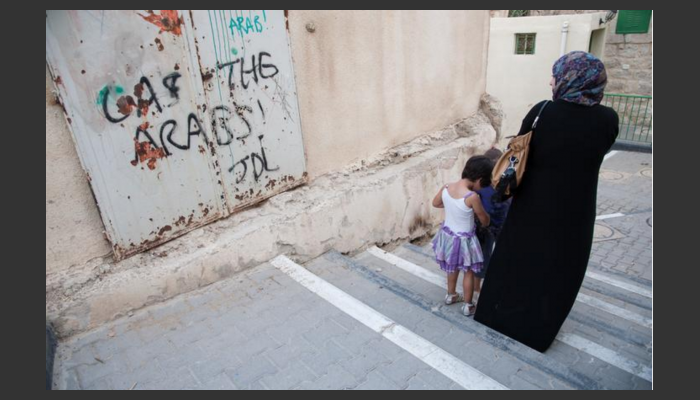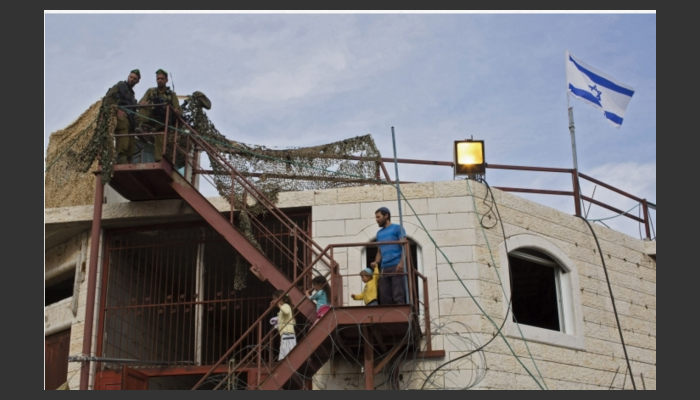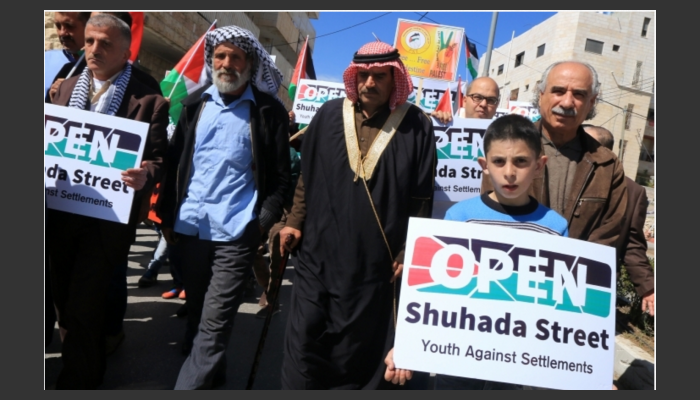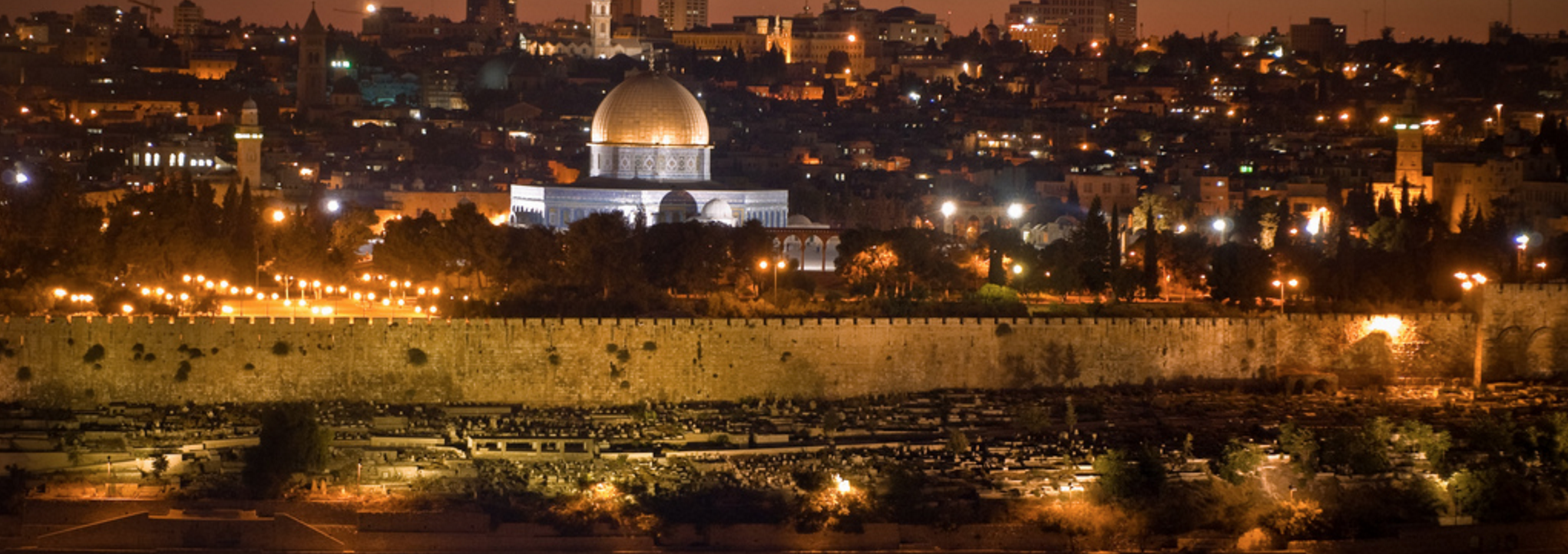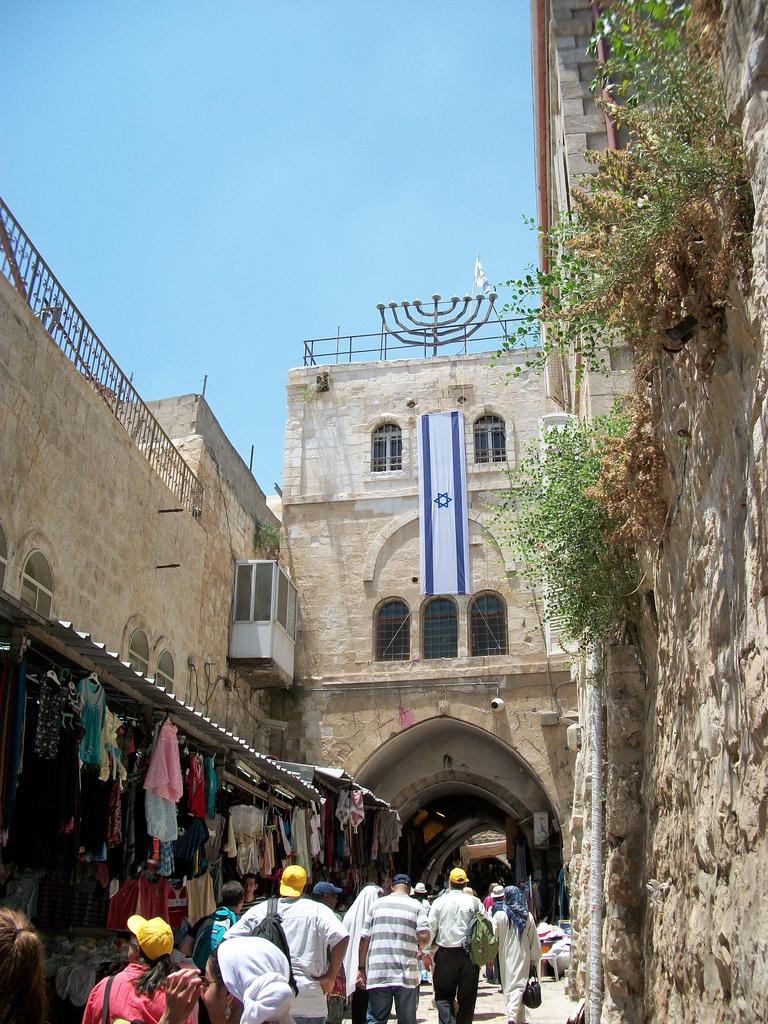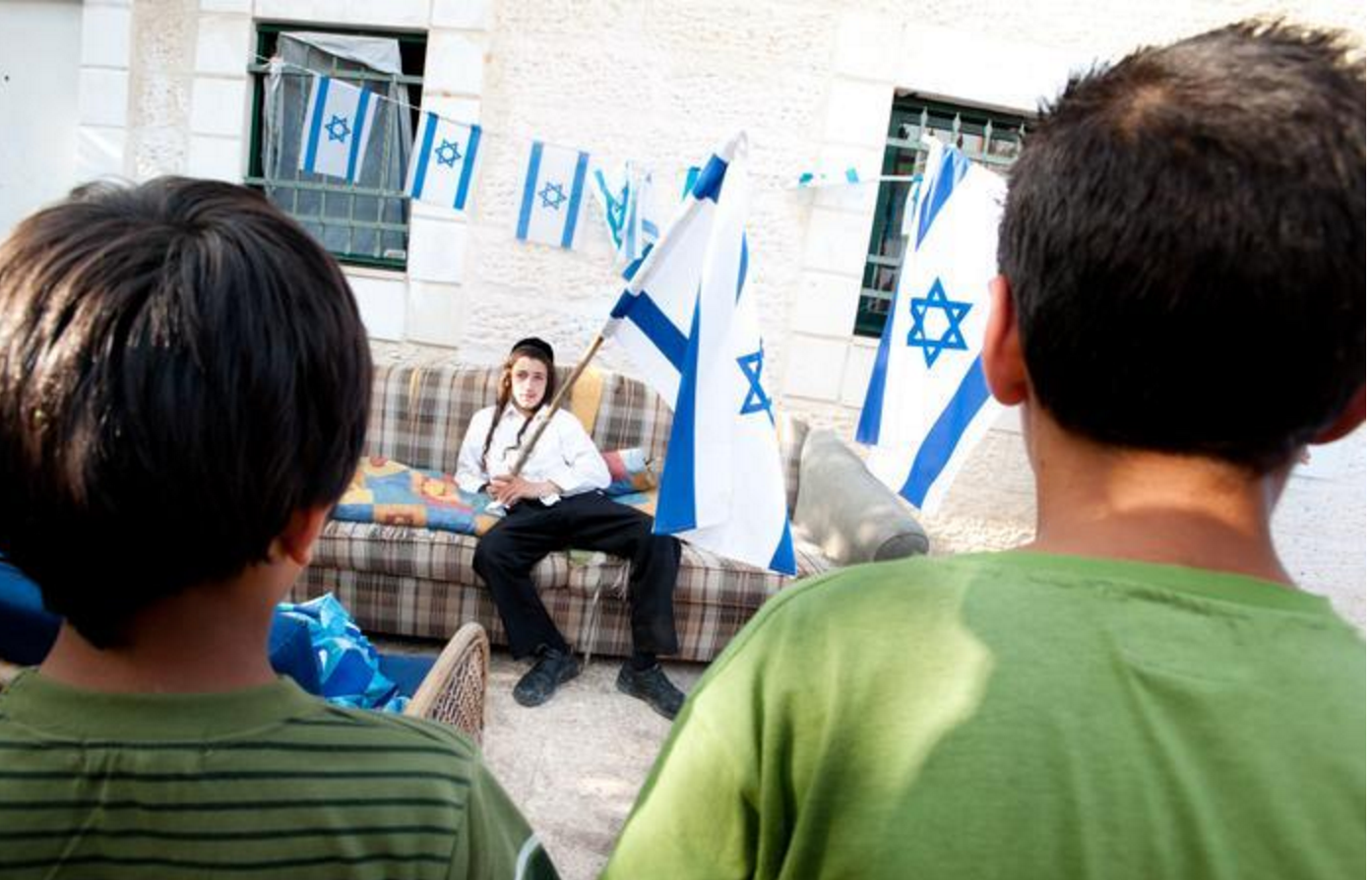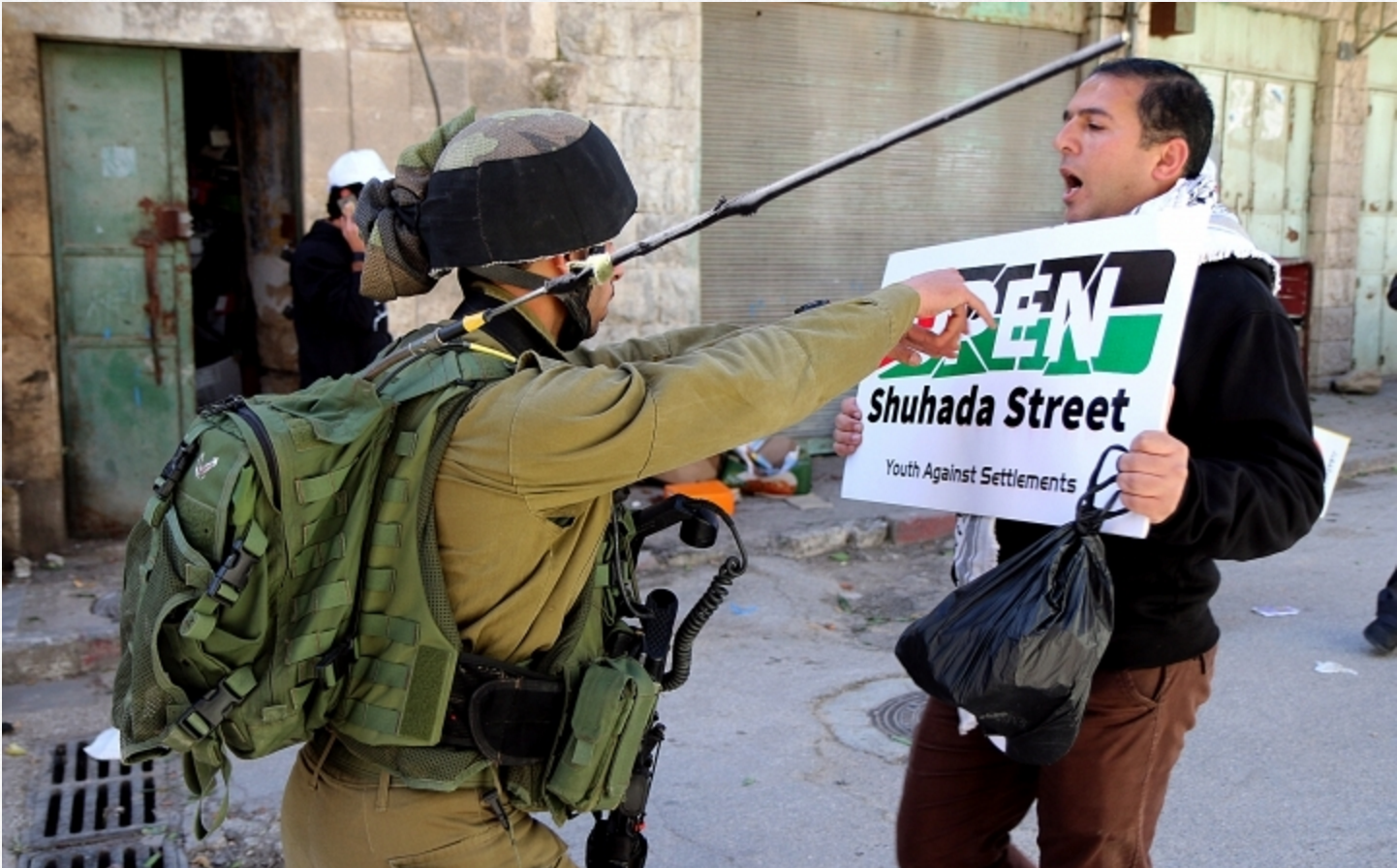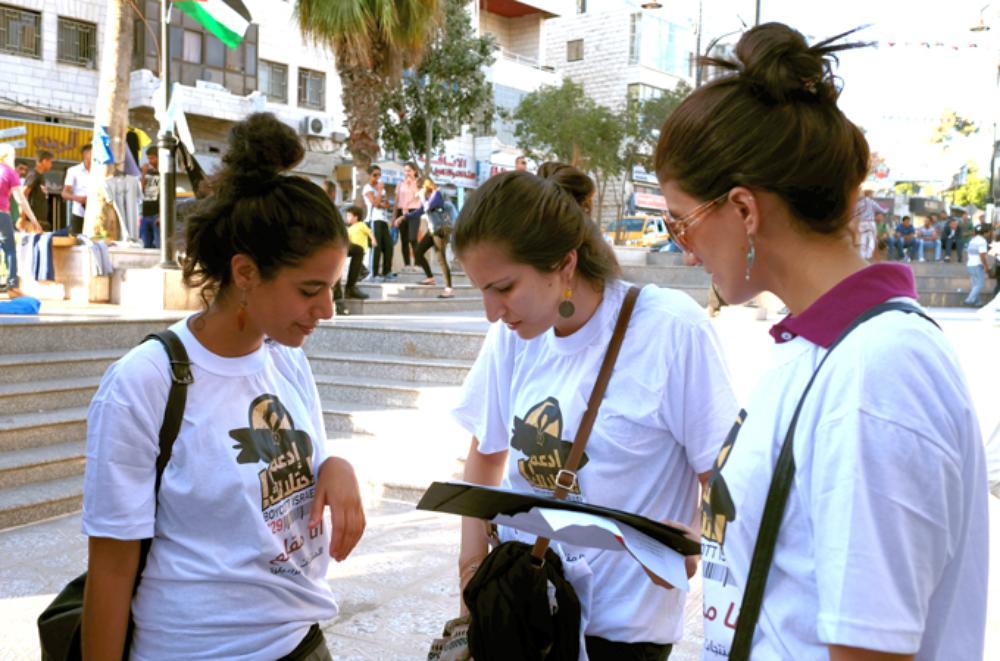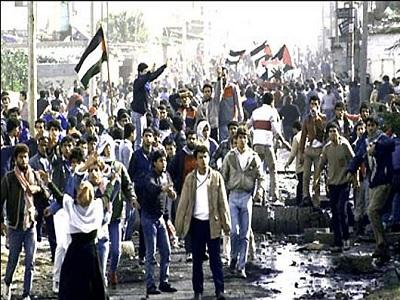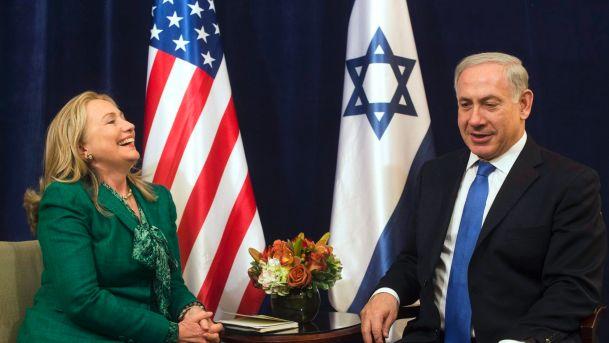People often say that what’s happening in Palestine is difficult to understand or too complicated to take a stand on. In this resource, we show that the situation, in its essence, is actually pretty straightforward. This page is a summary of the pages that follow. You can navigate between the pages using the arrows at the top and bottom of each page or using the menu on the left hand side.
Israel was formed in 1948 through the brutal displacement of nearly 800,000 Palestinians and the destruction of more than 530 towns and villages. This pre-meditated ethnic cleansing is known as al-Nakba, the catastrophe. Since then, Israel has implemented a regieme of settler colonialism, apartheid and occupation. over the Palestinian people.
There are many similarities between apartheid in South Africa and modern day Israeli apartheid. South African apartheid was characterised by settler colonialism and the forced displacement of the indigenous population, the division of the colonised into different groups with different rights, severe restrictions on movement and violent suppression of resistance. These are all key characteristics of Israel’s modern day regime over the Palestinian people.
However, the validity of the apartheid analysis of Israel’s regime over the Palestinian people does not depend on similarities between Israeli policies and South Africa under apartheid. Israel’s oppression of Palestinians meets the definition of the crime of Apartheid that is set out by the 2002 Rome Statute of the International Criminal Court.
The majority of Palestinians are the 7.25m refugees who have been forced from their homes to make way for Jewish Israelis and are denied their right to return to their homes. The demand that Palestinian refugees be allowed their right to return to their homes is a key demand of the Palestinian struggle for freedom, justice and equality.
Israel says it is a "Jewish and democratic" state. However, the 20% of the population of Israel who are Palestinian citizens of Israel who are subjected to a series of racist laws and segregation policies that facilitate the continued ethnic cleansing of Palestinian citizens of Israel and make them third class citizens. A state that gives different rights to different people based purely on their ethnic identity cannot be described as a democracy.
Israel carried out horrific massacres of Palestinians in Gaza in 2008-09, 2012 and 2014. In all three attacks, the UN and human rights organisations have documented how Israel deliberately attacked Palestinian civilians, schools, hospitals and other civilian infrastructure and other war crimes. A UN report published in 2015 said that Gaza could be "uninhabitable" by 2020 as a result of the economic siege imposed by Israel and its regular attacks on Palestinians.
East Jerusalem is recognised as occupied Palestinian territory but Israel has annexed the city and is seeking to turn it into a Jewish Israeli city. It is seeking to do this by forcibly displacing Palestinians and transferring Israelis into the area in their place. The route of the Israel’s illegal apartheid wall deliberately cuts off East Jerusalem from the rest of the occupied West Bank.
Israeli policies in the West Bank aim to forcibly displace and concentrate the Palestinian population into isolated bantustans and ensure the continued expansion of illegal Israeli settlements on Palestinian land. There are now approximately 650,000 Israeli settlers living in more than 200 colonies or settlements in the West Bank (including East Jerusalem). Around half of the West Bank is allocated to the settlements or otherwise off limits to Palestinians.
Israel is only able to maintain its system of apartheid and settler colonialism over the Palestinian people because of the support that it receives from world governments and corporations. All states, particularly those 124 states that have ratified the Rome Statute of the ICC, have a legal obligation to suppress Israeli war crimes and crimes against humanity.
Waves of Palestinian popular resistance, especially the intifadas, has always revealed to Israel, the U.S. and other world powers that are complicit in maintaining Israel’s regime of oppression, that Palestinians will never accept slavery as fate. New generations will continue to rise up and assert their will to be free, against all odds.
The Palestinian BDS campaign is an effective way to provide support and solidarity to the Palestinian struggle for freedom, justice and equality. It aims to pressure Israel to comply with international law and to end international support for Israel’s regime of settler colonialism and apartheid.
You don’t have to be a history expert to understand what’s happening in Palestine. But it does help to be familiar with a few key facts and terms.
1948: Israel was established in 1948 through the premeditated and systematic ethnic cleansing of nearly 800,000 Palestinians and the destruction of more than 530 Palestinian towns and villages.
1967: Using the 1967 War with neighboring Arab states as an excuse, Israel captured and occupied the Gaza Strip and the West Bank, including East Jerusalem. This area is commonly referred to as the Occupied Palestinian Territory (OPT). In the same war, Israel also captured the Syrian Golan Heights. Israel has maintained control over these occupied Palestinian and Syrian territories ever since, in defiance of UN resolutions calling for its withdrawal.
Israel oppresses and displaces Palestinians, fragmenting them into different geographical areas. The map below shows where Palestinians are living today. Note how almost half of the Palestinian people are refugees living outside of Palestine, denied their right to return by Israel simply because they are Palesitnian.
The origin of Israel’s contemporary regime over Palestinians is found in the racist ideology of late 19th century European colonialism. This ideology was shared by the dominant stream of the Zionist movement, which was founded in Europe and would later establish the state of Israel.
Zionism claims that all people worldwide who identify themselves as Jewish belong to a “Jewish nation”, although these people are citizens of many countries, and that this “nation” has an inherent right to a “Jewish state” in Palestine, despite the presence of the indigenous Palestinian population.
Starting in the 1880s, the Zionist movement set up colonies in Palestine and promoted Jewish mass immigration. The movement spread the false and deeply racist idea that Palestine was a land without people for a people without a land.
Zionist settler colonialism enjoyed the political support of Western imperial powers. Britain was appointed by the victors of World War I to govern Palestine and lead it toward independence. In 1917, Britain committed to facilitate the establishment of a “national home” for the Jewish people in Palestine against the wishes of the indigenous Arab population. This commitment commitment set out in a letter by then UK foriegn secretary Arthur James Balfour and is known as the Balfour declaration.
Faced with resistance from the predominantly Arab indigenous population, the Zionist movement began to develop “transfer plans” from the early 1930s. In 1948, the Zionist movement carried out its plan of ethnic cleansing of the indigenous population and created the state of Israel. This set of events is known to Palestinians as al-Nakba, the Arabic word for catastrophe.
The four Great Powers are committed to Zionism. And Zionism, be it right or wrong, good or bad, is rooted in age-long traditions, in present needs, in future hopes, of far profounder import than the desires and prejudices of the 700,000 Arabs who now inhabit that ancient land.
The Nakba refers to the ethnic cleansing of the indigenous, predominantly Arab population of Palestine that was carried out by the Zionist movement to enable the establishment of Israel. The photo album below shows the society that existed before the Nakba took place.
The Zionist leadership began to seriously consider the forcible transfer of the Palestinian Arabs from Palestine in the 1930s. In 1947, the UN recommended the partition of Palestine, suggesting that more than half of the country become a “Jewish state”. As the prominent Palestinian historian Walid Khalidi writes:
“Overall, Jewish land ownership in the whole of Mandatory Palestine in 1948 totaled 1.7 million dunams (1 dunam = 1,000 square meters) [less than 6%]. The area designated for the Jewish state was 15 million dunams. So what the UN was effectively saying to the Yishuv was: go seize those additional 13.3 dunams that you don’t own from those who do—from the largely agricultural people who live in those areas and derive their livelihood from them.”
Zionist forces immediately launched an all-out armed attack against the indigenous Palestinian population that protested against partition. Many Palestinians were expelled or were forced to flee from their communities by the far better-armed Zionist forces. Dozens of massacres were carried out in places where people refused to flee.
As the photo album below shows, the scale of destruction was both premeditated and staggering. By 15 May 1948, when the Zionist movement announced the establishment of the State of Israel and the surrounding Arab states declared war, around 300,000 Palestinians had already been made refugees. By 1949, Israel had conquered 78% of Palestine and the number of expelled Palestinians had reached close to 800,000. More than 500 Palestinian villages and 11 towns were destroyed during or after the Nakba.
These crimes enabled the appropriation of the ethnically cleansed Palestinians’ land, and the promotion of mass Jewish immigration in order to create a Jewish majority in the new State of Israel. Yet as we shall see in the sections that follow, the Nakba is not just a single event but continues today as an ongoing catastrophe for the Palestinians.
Colonialism is the practice of a foreign state or group of people exercising control over another country or area. Settler colonialism is a form of colonialism in which settlers create societies that are distinct from the indigenous population and seek to control land and resources and establish their own economy and system of governance.
Since the settler society is primarily concerned with control of land, it seeks to eliminate or forcibly remove the indigenous population and replace it with members of the settler population.
This makes settler colonialism different from other forms of colonialism that may focus on exploiting the labour or resources of the colonised country. As leading academic on settler colonialism Patrick Wolfe explains, “settler colonialism destroys to replace".
Settler colonialism can be used to describe what has taken place in New Zealand, Australia, South Africa, the US and Canada, and, some argue, what France attempted but ultimately failed to achieve in Algeria.
Israel and settler colonialism
During and since its foundation in 1948, Israel has set out to control as much of the land of historic Palestine as possible and drive as many Palestinians from the land as it can. To this day, Israel continues to steal land, construct Jewish-only settlements, expel some Palestinians while cornering others into crowded ghettos, surrounded by walls, military watchtowers and checkpoints. (See this map showing Israeli ethnic cleaning, settler colonialism and apartheid, 1948 - present)
This map below shows how the Zionist movement and then Israel has taken control of huge parts of historic Palestine, leaving only small parts of the land available for Palestinians to live on and develop.
This next map shows how Israel has established new settlements and cities on areas that were previously inhabited and used by Palestinians:
Israel’s official ideology is Zionism, which holds that the “Jewish nation” has an inherent right to the land of Palestine. This ideology has been translated into laws that claim Israeli sovereignty in almost all of Historic Palestine and provide the legal justification for the creeping annexation of the occupied West Bank, including East Jerusalem, and Gaza, as well as the ongoing forced displacement of Palestinians.
Jewish villages were built in the place of Arab villages...There is not a single place built in this country that did not have a former Arab population.
Continuing settler colonialism
Settler colonialism is a defining and ongoing feature of Israel’s oppression of Palestinians. For example:
- In the occupied West Bank, Israel forces Palestinians from their lands and demolishes their homes to make way for illegal Jewish-only settlements, condemned as illegal by the world. Nearly half of the West Bank is now off limits to Palestinians.
- Palestinians who live in present-day Israel also continue to be forced from their homes to make way for new Jewish Israeli settlements and towns. Palestinians who refuse to leave their houses voluntarily have them demolished.
- The situation is particularly severe in the Naqab [Negev] desert in the south of present-day Israel, where Bedouin Palestinians are currently being concentrated into townships. The UN has condemned this Israeli plan of concerted ethnic cleansing plan as a “strategy of Judaization” that “excludes, discriminates against and displaces minorities, particularly affecting Palestinian communities, side by side with the accelerated development of predominantly Jewish settlements.”
- Israel often uses the same methods to forcibly remove Palestinians in both Israel and the occupied West Bank. These tactics include demolishing buildings on the pretence that Palestinians don’t have the correct permits, the rezoning of land as military or state land, and preventing Palestinians from physically accessing their land.
- Palestinians who live in the occupied Gaza Strip are also victims of Israeli settler colonialism: Israel has pushed them into a confined and besieged area and the 70% of the population of Gaza who are refugees are denied their UN-stipulated right to return to the lands from which they were forcibly displaced during the Nakba in order to maintain a Jewish Israeli majority in other areas of historic Palestine.
- In addition to physically displacing Palestinians and taking control of their land, Israel appropriates Palestinian resources, dismantles Palestinian institutions, deliberately undermines and attacks Palestinian economic activity, and violently suppresses Palestinian resistance, including nonviolent resistance, to this.
Colonialism under international law
Colonialism has been absolutely prohibited under international law since the 1960s. This prohibition is reflected in many UN resolutions including United Nations General Assembly Resolution 1514 (1960) on the granting of independence to colonial countries and peoples.
Since international law is made by states, including many with a settler colonial founding history, the prohibition of colonialism does not apply retroactively or within the borders of existing states. Therefore, Israel cannot be held legally responsible for colonialism in connection with its regime of oppression against Palestinians living within its internationally recognized pre-1967 borders.
However, many independent legal studies have shown Israel to be violating the legal prohibition on colonialism in the Palestinian territory that Israel occupied in 1967. According to these studies, the main Israeli acts of colonialism in the Occupied Palestinian Territory are:
- Violation of territorial integrity, for example through the annexation of East Jerusalem, building settlements, the Wall and the separation of the Gaza Strip.
- Violation of Palestinian sovereignty over natural resources, for example through the confiscation and exploitation of land and water.
- Integration of the Palestinian economy into the Israeli economy.
- Denying Palestinians the right to freely express, develop and practice their culture.
- Depriving Palestinians of the capacity for self-governance, for example by changing local laws, dismantling Palestinian institutions, and by forcibly displacing Palestinians.
Many elements of South African apartheid are also key characteristics of Israeli apartheid
Apartheid in South Africa
Apartheid is an Afrikaans word meaning ‘separation’ and was the name given to the system of racial segregation and subjugation of the African and other non-white population of South Africa by white settlers from 1948 to 1994.
Apartheid was not just about dispossession, physical separation and denial of equal rights. It also involved control and humiliation through discriminatory laws, pass books, location permits, police raids and other violent measures. South African resistance movements, supported by an international solidarity and boycott campaign, eventually succeeded in overthrowing the apartheid regime.
While there are many differences between the South African apartheid regime and the Israeli regime over Palestinians, common to both systems is the intention to maintain and consolidate domination through racial discrimination and oppression that are enshrined in law, not just policy.
South African apartheid was characterised, among other things, by settler colonialism and the forced displacement of the indigenous population, the division of the colonised into different groups with different rights, severe restrictions on movement and violent suppression of resistance. These are all key characteristics of Israel’s modern day regime over the Palestinian people.
Apartheid under international law
The validity of the apartheid analysis of Israel’s regime over the Palestinian people does not depend on proving that Israeli policies and racist laws are identical to those of the apartheid regime in South Africa. Like slavery or genocide, apartheid is a crime that is defined in international law that any state may be guilty of committing.
Like colonialism, apartheid is a severe violation of international law and absolutely prohibited for states. In addition, and unlike colonialism, apartheid is defined as a crime against humanity by the UN’s 1973 International Convention on the Suppression and Punishment of the Crime of Apartheid and by the 2002 Rome Statute of the International Criminal Court (ICC).
Inhumane acts … committed in the context of an institutionalized regime of systematic oppression and domination by one racial group over any other racial group or groups and committed with the intention of maintaining that regime.
In order to facilitate the continued ethnic cleansing of Palestinians and ensure the domination of Jewish Israelis over Palestinians, Israel has implemented a regime of institutionalized racial discrimination and systematic oppression over the Palestinian people that meets the UN definition of apartheid.
Inhumane acts … committed in the context of an institutionalized regime of systematic oppression and domination by one racial group over any other racial group or groups and committed with the intention of maintaining that regime.
One territorial unit
Israel today has de-facto control over all of Israel and the Occupied Palestinian Territory. Despite the partial responsibility for some aspects of rule in the West Bank and Gaza Strip given to the Palestinian Authority, Israel maintains its military occupation and overall control of these areas.
Israel controls the borders, airspace, natural resources, communication and transport infrastructure and the financial system, and it exercises this control in a manner that discriminates against Palestinians and favors Jewish Israeli settlers.
In effect, Israel and the Occupied Palestinian Territory constitute one territorial unit under full Israeli control. As of 2015, of the total population of people that live in Israel and the Occupied Palestinian Territory, around 6.6 million are Jewish Israelis and about 6.4 million are Palestinians.
Yet under Israeli law and in practice, Jewish Israelis and Palestinians are treated differently in almost every aspect of life including freedom of movement, family, housing, education, employment and other basic human rights. Dozens of racist Israeli racist laws and policies institutionalize this prevailing system of racial discrimination and domination.
While Palestinian citizens of Israel are able to vote and put themselves forward as candidates in Knesset elections, elected Palestinian representatives cannot achieve justice and equality through law reform because of the quasi-constitutional status of some of the founding discriminatory laws, and the support for these laws by all Zionist political parties.
Systematic oppression and domination
The way in which Israel racially discriminates against Palestinians and favors Jewish Israelis is not temporary or accidental. It is institutionalized and written into the laws that govern how the Israeli state operates.
Immediately after 1948, Israeli lawmakers began to adopt a series of laws that would guarantee Jewish Israeli supremacy, domination and control of the country that had been conquered and ethnically cleansed of most of its indigenous population in the Nakba. The legal pillars of Israel’s institutionalized system of racial domination and oppression include:
- Laws such as the Law of Return (1950) and the Israeli Citizenship Law (1952) that stripped Palestinian refugees of their right to citizenship and gave an almost absolute right to citizenship and a range of other privileges to any Jewish individual and his/her relatives. These laws grant the superior civil status of “Jewish nationality” to Jewish Israelis. “Jewish nationals and citizens of Israel” have superior rights to Palestinians who are only citizens.
- Land and property laws, such as The Absentees’ Property Law (1950), which “legalize” the confiscation of the Palestinian land and homes.
- Laws that grant public status and functions in Israel to Zionist organisations, such as the “Jewish National Fund”, that operate as private “charities” in many countries despite their openly racist charters and mandates to work for the exclusive benefit of the “Jewish people”.
Racial segregation
Since 1948, Israel has carried out institutionalized policies of racial segregation as a means of ensuring its domination over the Palestinian people. These policies aim to privilege the Jewish Israeli population while controlling Palestinians and denying them equal rights.
Segregation is carried out by means of separate legal regimes for Jewish Israelis and Palestinians living in the same area. For example, Jewish Israeli settlers living in the illegal Israeli settlements in the occupied West Bank are governed by Israeli civil, including criminal, law, while Palestinians also living in the occupied West Bank, with the exception of East Jerusalem, are governed by Israeli military law. Israel was criticized for violating the right to equality in a 2012 report by the UN Committee on the Elimination of Racial Discrimination (CERD). Describing the existence of two separate legal systems in the West Bank, the committee said it was “appalled at the hermetic character of this segregation.”
Segregation is also carried out physically. Inside Israel as well as in the Occupied Palestinian Territories, Israeli policies physically separate areas of Palestinian and Jewish Israeli population as a means of privileging the latter. The siege imposed on the Gaza Strip is a clear example of how Israel concentrates Palestinians into ghettos, preventing them from accessing areas that Israel has designated for the sole use of Jewish Israelis.
Inhumane acts of apartheid
In order to maintain racial domination, apartheid regimes carry out criminal acts against the oppressed population. These “inhumane acts” of apartheid are defined in the Apartheid Convention and the Rome Statute of the International Criminal Court. Israel has committed a broad range of such inhumane acts of apartheid since 1948, including:
- Forcible transfer of populations, including forcible displacement and confinement, forced exile and preventing Palestinians from returning to their homes and lands, revoking residency rights and the expropriation of Palestinian land for the benefit of Israel’s Jewish population.
- Persecution - meaning systematic and severe deprivation of fundamental human rights - of Palestinians based on their identity.
- Persecution of Palestinians because of their opposition to apartheid.
- Murder, torture, unlawful imprisonment and other severe deprivation of physical liberty.
The West Bank, including East Jerusalem, and the Gaza Strip were occupied by Israel in the 1967 War and are internationally recognised as Occupied Palestinian Territory (OPT).
Occupation is a regime for temporarily maintaining public order in a territory seized during armed conflict. Unlike annexation or colonization, occupation is defined as a temporary regime that preserves the original status of the occupied territory. As such, occupation is not prohibited under international law.
During occupation, the occupying power must respect the laws of war, usually called international humanitarian law (IHL). This includes the Hague Convention and Regulations of 1907 and the Fourth Geneva Convention of 1949. IHL protects basic human rights of civilians in armed conflict. Certain violations of IHL constitute war crimes.
In the course of its prolonged, decades-old occupation, Israel has systematically violated IHL and human rights and committed war crimes. For example, Israel:
- Uses indiscriminate and deliberate armed force against Palestinian civilians.
- Changes local laws and institutions in a manner that deprives the occupied Palestinian population of status and rights.
- Confiscates Palestinian property and land, and destroys Palestinian homes and civilian infrastructure without military necessity.
- Forcibly displaces Palestinians in a manner that is neither temporary nor serving the safety of the displaced.
- Imposes arbitrary restrictions on the freedom of movement of the occupied Palestinian population.
- Transfers Israeli civilians into occupied territory and constructs settlement infrastructure for this purpose.
- Exploits Palestinian natural resources for its own benefit.
- Permanently annexes occupied Palestinian territory, in particular areas in which it has established Jewish settlements.
Why the word “occupation” isn’t sufficient
These Israeli violations of IHL are one of the reasons why the word “occupation” is not sufficient to describe Israel’s regime over Palestinians. Carried out systematically since 1967, these IHL violations have resulted in a situation where Israeli control of the Occupied Palestinian Territories is neither temporary nor about keeping public order. Instead, it is about taking permanent control of occupied Palestinian land, depriving the occupied population of fundamental human rights and preventing the self-determination of the Palestinian people.
In international law, a regime that systematically violates IHL in the manner in which Israel does is responsible for colonialism. In 2004, the International Court of Justice reached a similar conclusion. It found that Israel’s illegal Wall in the Occupied Palestinian Territories facilitates many of the aforementioned violations of IHL, including forcible transfer of populations and permanent annexation.
On this basis, the Court ruled that Israel is responsible for the acquisition of occupied Palestinian territory by force and for the violation of the right to self-determination of the Palestinian people.
However, there are additional reasons why, legally speaking, “occupation” alone isn’t helpful and doesn’t appropriately characterize Israel’s oppressive regime:
- On its own, the word “occupation” fails to convey or describe the scale of Israel’s oppression of Palestinians.
- Israeli occupation is internationally recognized only in the Occupied Palestinian Territories . Israeli oppression of Palestinians, however, is not limited to the Occupied Palestinian Territories and dates back at least to 1948.
- Designation of Israel’s regime in the Occupied Palestinian Territories as a regime of occupation only may inadvertently serve Israeli interests. It allows Israel to practice settler-colonialism and apartheid under the cover of a military regime that may impose restrictions on the human rights of the occupied Palestinian population on grounds of security and military necessity and is internationally tolerated and considered as temporary.
- When we hold Israel accountable for violating the international law prohibitions on apartheid and colonialism, we increase the legal obligations of third states (see section of this resource regarding the legal obligations of international goverments).
Palestinian refugees are the first and largest group of victims of Zionist settler colonialism and its efforts to replace the indigenous Palestinian population and obtain sovereignty over Palestine.
Palestinians were expelled from their homeland by the settler colonial Zionist movement during the Nakba of 1948 in order to make way for the creation of the state of Israel as a supremacist Jewish state. More Palestinians have been made refugees since 1967, as Israel carries out similar settler colonial policies in the OPT, forcibly removing Palestinians and populating their land with Jewish Israeli settlers in order to achieve permanent control.
Israel has not only pursued the displacement of Palestinians by armed force. It has also adopted laws and policies designed especially to facilitate the ethnic cleansing of Palestinians and to prevent any refugees returning to their homes, simply because they are Palestinians and not Jewish. Carried out in such a context of institutionalized racial discrimination, Israel’s forcible transfer of Palestinians and systematic exclusion of Palestinian refugees from the right to return to their homes and properties are criminal acts of apartheid.
Just over 6 million of the Palestinian refugees are victims of the Israeli ethnic cleansing of 1948 and their descendants. During the 1967 war, Israel expelled a further 400,000 Palestinians from the OPT. Israel’s forcible transfer of Palestinians is ongoing, and today there are approximately 1 million Palestinian refugees from the OPT and their descendants, most of whom live in Jordan. Approximately one third of all Palestinian refugees continue to live in refugee camps.
Human Rights Watch, which has defended the right of refugees to return to their homes in Bosnia, Chile, China, East Timor, Rwanda and Guatemala, among others, defended the right of Palestinian refugees to return stating: “It is a right that persists even when sovereignty over the territory is contested, or has changed hands."
Deprived of the right to return
Any Jewish person anywhere in the world can move to Israel and become an Israeli citizen. Ironically, this right is set out under an Israeli law called the Law of Return (1950). But because of Israeli apartheid, the more than 7.25 million Palestinian refugees are unable to return to their homes and most cannot even visit their homeland temporarily.
Israel conducted a population census following its mass expulsions of Palestinians in 1948 and 1967, each time excluding displaced Palestinians from registration. Israel then deliberately crafted citizenship and residency laws (the Israeli Citizenship Law 1952, military orders in 1967) that excluded those not registered in the census from legal status and all rights in the country. For this reason, Palestinian refugees cannot claim before Israeli courts their rights to return and to the property and land that was illegally confiscated from them.
In exile, Palestinian refugees have little means to claim their rights from Israel. Deprived of their means of livelihood, many Palestinian refugees have remained poor and dependent on aid. Most 1948 refugees are registered and receive assistance from the United Nations Relief and Works Agency for Palestine Refugees in the Near East (UNRWA). Many have suffered more discrimination and persecution in host countries, including most recently those in the Yarmouk refugee camp in Syria.
Targets of violent oppression
Israeli oppression has targeted Palestinian refugees in particular. Israel does this with the intention of administering collective punishment and permanently silencing their demand to return. In the 1950s, soon after the Nakba, Palestinian refugees trying to return home or harvest their crops were designated as ‘infiltrators’ and murdered in their thousands.
Hundreds of thousands of refugees have been killed, injured and forcibly displaced in Israeli military operations targeting Palestinian refugee camps resisting Israeli colonization and apartheid. Examples include Ariel Sharon’s war on the Gaza refugee camps in 1967 soon after the Israeli occupation, numerous Israeli attacks on Palestinian refugee camps in Lebanon, including the Israeli-orchestrated 1982 massacre in the Beirut camps of Sabra and Shatilla, the assault on the Jenin camp in 2002, and Israel’s military campaigns since 2008 against the occupied Gaza Strip and its large refugee population.
The Gaza Strip is a tiny strip of land that is just 40km long and 9km wide. With a population of 1.8m people, Gaza is one of the most densely populated areas on earth. Gaza was occupied by Israel along with the West Bank in 1967 and is internationally recognized as occupied Palestinian territory.
Israel has forcibly displaced and concentrated Palestinians to Gaza as a means of maintaining a Jewish majority in other parts of the land it controls. It keeps Gaza separate from the West Bank in order to prevent Palestinian self-determination, and to facilitate Israeli colonization of the occupied West Bank. These are characteristics of settler colonialism.
Israel carried out horrific massacres of Palestinians in Gaza in 2008-09, 2012 and 2014. Israel’s regular mass killings of Palestinian civilians in Gaza constitute war crimes. The United Nations has condemned Israel’s prolonged siege as a form of collective punishment, which is also a war crime. By deliberately destroying Gaza’s economy, systematically depriving its Palestinian population of the rights to life and physical liberty and imposing inhumane living conditions, Israel is carrying out criminal acts of apartheid.
Confined and besieged
From the start of the occupation in 1967, Israel has treated Gaza as a special “security problem” because of its large population of refugees demanding their right to return to their homes and land.
A separate branch of Israel’s military regime and a separate population register and ID card system were installed to ensure control. By the late 1980s, Palestinians already required an Israeli permit for traveling from Gaza into present-day Israel or the West Bank.
Israel uses alleged “security concerns” to justify its siege on Gaza by land, sea and air since 2006. As well as preventing people from moving in and out, Israel’s siege severely limits what goods can enter and exit, causing frequent crises in food, fuel and electricity supplies and prolonged power cuts. Medical services are severely hampered by shortages of medicine and electricity.
This denial of supply of essential goods and services was described by a senior Israeli official who said that “the idea is put the Palestinians on a diet, but not to make them die of hunger,” mainly because the latter is not good for Israel’s public relations. Health officials provided calculations of the minimum number of calories needed by Gaza’s 1.5 million inhabitants to avoid malnutrition.
“The idea is put the Palestinians on a diet, but not to make them die of hunger,”
The siege prevents Palestinian farmers from exporting their goods and severely and deliberately hampers economic activity. The unemployment rate in Gaza is the highest in the world, averaging 43% during 2014. Youth unemployment is around 60%.
Israel’s siege and deliberate attacks on water infrastructure have led to significant damage of the water infrastructure and the over exploitation of the Gaza aquifer. The result is a huge increase in rates of chloride and nitrates in water. More than 90% of the water supply has become not fit for human consumption, according to Unicef. Agricultural production is severely restricted for this reason.
A UN report published in 2015 said that Gaza could be "uninhabitable" by 2020 because of Israel’s economic siege, its military attacks, and the refusal of Israel to allow materials required for the reconstruction of houses destroyed by the Israeli military into Gaza.
Until 2004, Israel was in the process of establishing illegal settlements in Gaza and colonizing the territory. Since it removed its illegal settlements, permanent separation became Israel’s settler colonial objective for Gaza, where Palestinians are treated as a “separate population”. Under Israeli law, Gaza no longer has any legal link to the occupied West Bank. Palestinians in Gaza cannot leave, and Palestinians living elsewhere cannot enter Gaza.
Treating Gaza as a large prison camp, Israel has deported Palestinians from elsewhere in historic Palestine to Gaza. Palestinians in Gaza are at risk of permanent exclusion from their country, similar to the refugees in exile.
Military violence and mass murder
In addition to making daily life unbearable, Israel employs armed violence in an attempt to force Gaza Palestinians to submit to its regime of settler colonialism and apartheid.
Israel carried out brutal military assaults on Palestinians in Gaza in 2008-9, 2012 and 2014. In all three occasions, the UN and human rights organisations have documented how Israel deliberately attacked Palestinian civilians, schools, hospitals and other civilian infrastructure.
During its 2014 assault, Israel murdered more than 2,100 Palestinians and displaced more than 100,000. More than 9,000 houses were completely destroyed as Israel deliberately carpet-bombed entire neighborhoods.
Israel’s military operations against Palestinians in Gaza are based on its Dahiya Doctrine. Under this doctrine, Israel deliberately uses overwhelmingly disproportionate force against civilians and civilian infrastructure as a means to achieve submission to its geo-strategic objectives.
Israel’s mass murder, injury and forcible displacement of Palestinian civilians in Gaza amount to both war crimes and criminal acts of apartheid.
Although Palestinians have the right under international law to fish up to 20 nautical miles off Gaza’s coast under the Oslo Accords, Israel imposed a three-mile limit in June 2007, significantly undermining fishing activity. Even within this restricted area, fishermen face arrest and regular attacks and killings from the Israeli navy including gunfire, shelling, and the ramming of boats.
Palestinians are also routinely shot and killed by Israeli military if they enter the Israeli imposed a ‘buffer zone’ inside the occupied Gaza Strip, a no-go area that extends along the northern and eastern perimeter bordering Israel.
Several independent experts have also warned of the danger that Israel’s brutal assaults on the Palestinian population of Gaza may turn into genocide, because of the massive use of force, and because Israel deprives people of the option to flee the fenced-in and blockaded Gaza Strip.
After the Nakba in 1948, approximately 150,000 Palestinians remained in the territory that became Israel. Today, they and their descendants make up 1.65 million or about 20% of the population of Israel.
Israeli settler colonialism continues until today, particularly in areas where Palestinian citizens of Israel have remained a majority of the population such as in the Galilee and the Naqab. In these areas, Israel seeks to achieve demographic change and to tighten its control of land through the administrative fragmentation of territory, ethnic cleansing and the settlement of Jewish Israeli population.
In order to maintain itself as an exclusive “Jewish state” and to continue its settler colonialist policies, Israel has established a system of racist laws and segregation policies that privileges its Jewish population, makes Palestinians second-class citizens and facilitates their systematic oppression. Routine deprivation of fundamental rights, forcible transfer and repression of peaceful resistance characterize Israel’s regime of apartheid over Palestinian citizens.
Nationality vs. Citizenship
Israel has deliberately avoided the creation of an “Israeli nationality” that would grant, at least theoretically, equal status to its Jewish and Palestinian citizens. Instead, the full rights of nationals in Israel are reserved for “Jewish nationals” as defined by Israel’s Law of Return (1950). Palestinians are given the inferior status of simple “citizens of Israel”, with no nationality or group rights.
Based on this distinction and by means of more than 50 racist laws and administrative policies of racial segregation that discriminate against Palestinian citizens and residents, Israel systematically oppresses its Palestinian population. Even the US Department of State Department says that Palestinian citizens of Israel face "institutional, legal, and societal discrimination".
Israel routinely denies Palestinian citizens of Israel their fundamental rights:
- The right to freedom of movement and residency: In 43% of towns in Israel, residential admission committees filter out applicants on the grounds of “incompatibility with the social and cultural fabric”. These committees, which have been approved by the Israeli Supreme Court, are “used to exclude [Palestinian] Arabs from living in rural Jewish communities”, as Human Rights Watch has noted. In 2015, only 4.6% of new housing units established by the government were built in Palestinian areas.
- The right to family: The Citizenship and Entry into Israel Law, first adopted in 2003, “imposes severe restrictions on the right of Israeli citizens … to apply for permits for their Palestinian spouses and children from the Occupied Palestinian Territory to enter and reside in Israel for purposes of family unification”. This law has the effect of dividing Palestinian families and separating spouses.
- The right to an adequate standard of living: Racial segregation through separate “Arab departments” and “Arab and Jewish sectors” within many Israeli public and administrative bodies facilitates systematic under-funding and under-servicing of communities and institutions of Palestinian citizens. In the "mixed" town of Lydd, Israel has build a wall to separating the Palestinian Lod neighborhood of Pardes Snir and the neighboring Jewish Israeli area Nir Tzvi.
- The right to education, cultural rights: The educational systems for the two populations in Israel is separate and unequal. Government spending on schools for Jewish Israeli children is $1,100 per year per child, compared to just US$191 per child in Palestinian schools, almost six times less.
- The right to work: Palestinians also face severe discrimination in the job market. Only 6.6% of Israeli state employees are Palestinian. Communications giant Bezeq employs less than a dozen Palestinians out of a total workforce of 10,000. Some employers, including public bodies, require service in the Israeli military as a condition for employment, making jobs off-limits to most Palestinian citizens. Of the 30 communities with the highest unemployment in 2010, 27 of them were Palestinian.
Ongoing ethnic cleansing
Within the apartheid legislation adopted by Israel are a series of laws that facilitate the arbitrary confiscation of Palestinian property by the state. Before the 1948 Nakba, Palestinians owned more than 90% of the land. Today, the Israeli state controls 93 percent of the land in Israel, and the Israel Land Administration (ILA), manages and allocates this land in a way that prioritises Jewish Israeli development.
Many Palestinian Bedouin communities in the Naqab in the south of Israel are categorized as ‘unrecognised’. Using this categorization as justification, Israeli authorities leave these communities without public services, promote lawsuits against them for “trespassing” on state land, demolish their homes and poison their crops. While many have already been dispossessed and forcibly removed, approximately 70,000 Bedouin Palestinians continue to struggle to remain on their land.
Repression of opposition and resistance
Resistance by Palestinian citizens of Israel to the settler colonialism and apartheid policies they face is repressed in a number of ways:
- Although Palestinian citizens have the right to vote and stand as candidates in elections, they are denied full and equal political participation. Under Israeli law, Palestinians wishing to stand for election must swear allegiance to Israel and its discriminatory ‘Basic Laws’, meaning they are unable to challenge the fundamental systematic oppression they face.
-
Palestinians elected to the Israeli parliament are also routinely targeted by racist rhetoric by Israeli officials and media.
-
Palestinian citizens also have no access to effective legal remedy because there is no right to equality in Israeli law that could trump existing apartheid legislation.
-
Participants in peaceful public protests have repeatedly been killed or injured by Israeli police.
Approximately 2.7 million Palestinians live in the occupied West Bank, outside East Jerusalem. The West Bank, like Gaza, was occupied by the Israeli military in 1967. The colonisation of the West Bank started shortly after and continues to the present day.
Israeli policies in the West Bank aim to forcibly transfer and concentrate the Palestinian population into isolated bantustans and ensure the continued expansion of illegal Israeli settlements on Palestinian land. As in other parts of historic Palestine, Israel is setting out to control as much of the West Bank as possible and drive as many Palestinians from the land that it controls as it can. Settler colonialism is a key characteristic of Israeli policies and actions in the West Bank.
There are now approximately 650,000 Israeli settlers living in more than 200 colonies or settlements in the West Bank, iincluding in East Jerusalem). Around half of the West Bank is allocated to the settlements or otherwise off limits to Palestinians.
While Israeli settlers are governed by Israeli civilian law, Palestinians in the West Bank (outside East Jerusalem) are ruled by Israeli military law. Palestinians in the West Bank face physical segregation, systematic discrimination and violent repression so that Israel can maintain the racial domination of Jewish Israelis over Palestinians. Israel’s policies in the West Bank amount to apartheid, as independent studies have shown.
Maximum land, minimum Palestinians
Around half of the West Bank has been allocated to illegal Israeli settlements or the Israeli state and is off limits to Palestinians. Israel particularly focuses its efforts to displace Palestinians on the 60% of the West Bank designated by the Oslo Accords as ‘Area C’ and under direct Israeli control.The illegal Israeli settlements on stolen and forcibly vacated Palestinian land are financed by and built under the direct control of the Israeli government. Violent settlers who carry out attacks on Palestinians are protected by the Israeli military and are rarely held accountable.
Palestinian houses built in Area C without an almost impossible to obtain Israeli construction permit are demolished. Since 1967, Israel has demolished 25,000 Palestinian homes, most of which have been in the West Bank. In the period 2011-2014 alone, 4,298 Palestinians were displaced due to demolitions or evictions. Israel also regularly rezones Palestinian land in Area C as property of the Israeli state or as a “closed military area” as a pretext for house demolitions and forced displacement.
By implementing a range of measures aimed at making rural life difficult, especially in the fertile Jordan Valley area, including restrictions on freedom of movement, denying farmers water or their ability to access their land or get their goods to market, Israel indirectly forces many Palestinians to leave rural areas and live in cities.
Israel has constructed and continues to expand an Apartheid Wall through the occupied West Bank that is designed to separate East Jerusalem from the rest of the West Bank, facilitate the annexation of more occupied Palestinian land, and to physically segregate Palestinians living to the east of the wall from the rest of historic Palestine.
More than 85% of Israel’s wall is illegally built on occupied Palestinian land. It often cuts through Palestinian villages, separating families from each other and farmers from their lands. A 2004 ruling of the International Court of Justice confirmed that the wall is illegal under international law.
Separate and unequal
There are two separate legal systems in the occupied West Bank and which one you are governed by depends on whether you are an indigenous Palestinian or a Jewish Israeli settler. Israeli settlers live under Israeli civilian laws, while Palestinians living in the West Bank are subject to repressive military law and more than 1,600 military orders impacting every aspect of their lives.
While Israeli settlers are free to move around as they please, West Bank Palestinians face a network of checkpoints, routine closures and curfews and other restrictions that deny them their freedom of movement. Palestinians in the West Bank are frequently prevented from accessing healthcare or educational facilities.
Israel has constructed a network of roads that are for exclusive benefit of Israeli settlers. As a 2013 UN fact-finding mission put it, there is now a “system of total segregation” between the Israeli settlements and Palestinian population areas.
The West Bank is rich in water resources, but Israel illegally controls all sources of water in the West Bank and deliberately allocates water in a discriminatory way. Israelis and Israeli settlers are on average able to use four times more water than Palestinians. Many Palestinians are unable to access enough water for good health or for agriculture. Amnesty International has accused Israel of depriving Palestinians of their access to water “as a means of expulsion”.
Israeli forces routinely deploy live ammunition, tear gas and rubber-coated metal bullets against popular demonstrations. In 2012, there were a total of 6,193 Israeli army raids in Palestinian communities in the West Bank. In the period 2000-2015, more than 2,000 Palestinians in the West Bank were killed by the Israeli military.
Israel uses mass incarceration to discourage Palestinians from resisting its regime of apartheid and settler colonialism. Palestinians can be imprisoned simply for being a member of a political party or taking part in a peaceful demonstration. There are more than 7,000 Palestinian political prisoners in Israeli jails, hundreds of whom are detained without trial.
In the 1948 Nakba, Israel conquered the western part of Jerusalem and the city became divided into Israeli-controlled West Jerusalem and Jordanian-controlled, Palestinian East Jerusalem.
In 1967, Israel occupied and annexed the eastern part of the city, claiming sovereignty there. Israel has declared East Jerusalem to be part of “United Jerusalem, the Capital of Israel” under a basic law of 1980 and treats the occupied Palestinian city as if it were part of its own territory. Israel’s claim of sovereignty is rejected internationally, with East Jerusalem recognized as an integral part of the occupied Palestinian territory.
Israel is practicing settler colonialism in East Jerusalem and is seeking to transform it into a Jewish-Israeli city. It does this mainly through a policy of population transfer. House by house, Palestinians are forced from their homes so that Jewish Israelis can live in them and to facilitate the construction of illegal Israeli settlements.
Between 250,000 – 300,000 Palestinians live in East Jerusalem today, making up just over half of the population of occupied East Jerusalem. Up to 45% of the population are Jewish Israeli settlers, most of whom live in 16 major illegal Israeli settlements that have been established since 1967.
Israel is blatantly committing the crime of apartheid in East Jerusalem. Israel has shaped and applied its domestic system of racist laws and segregation policies to occupied East Jerusalem in a way that subjects Palestinians to systematic discrimination and serves its on-going ethnic cleansing of Palestinians from the city.
Institutionalized racial discrimination
Israel has shaped and applied its domestic system of racist laws and segregation policies to occupied East Jerusalem in a way that serves its ongoing ethnic cleansing of Palestinians from the city.
Israel deliberately denies Palestinians in East Jerusalem access to adequate public services and budgets. This Israeli policy of deprivation has resulted in de-development, poverty, marginalization and forcible displacement for Palestinians in the city.
The similarities between the situation of East Jerusalemites and black South Africans is very great in respect of their residency rights. We had the old Group Areas Act in South Africa. East Jerusalem has territorial classification that has the same sort of consequences as race classification had in South Africa in respect of who you can marry, where you can live, where you can go to school or hospital.
A constant strategy adopted by all Israeli governments in East Jerusalem and in the rest of occupied Palestinian, “left”, right or center, is making the lives of Palestinians so difficult that they will “transfer themselves willingly”, clearing the land for further Jewish Israeli colonization.
Ongoing forcible transfer
Under the cover of the 1967 war, the Israeli military carried out the first round of ethnic cleansing in East Jerusalem. Entire Palestinian quarters in Jerusalem’s Old City were demolished and their inhabitants evicted for the construction of Israel’s new “Jewish Quarter”.
The Israeli Municipality of Jerusalem uses urban planning to as a tool for achieving forced displacement of Palestinians. Israel has allocated or reserved 87% of East Jerusalem for Israeli-Jewish development. Palestinian construction is restricted to 13% of East Jerusalem, most of which is already built upon.
Demolitions and forced evictions are carried out where Palestinian homes are built without permits, which are granted to Palestinians far less frequently than to Jewish settlers. In the period 2009-2014 alone, Israel demolished 467 Palestinian structures, mainly homes, forcibly displacing 1,117 people within and from East Jerusalem.
Like Palestinian citizens of Israel, Jerusalem Palestinians have since 2003 been prevented from uniting with spouses and children from elsewhere in historic Palestine.
Today, in Palestinian neighborhoods adjacent to the Old City, such as Sheikh Jarrah, Silwan and Issawiya, the Israeli government is collaborating with Jewish settlers and their extremist and violent organizations to evict Palestinians and destroy their homes for the development of Jewish-Israeli national parks and tourist sites. In the outskirts of East Jerusalem, houses in Palestinian communities such as Beit Hanina and Shufat are being destroyed to make space for new illegal Israeli settlements and Israeli highways that connect settlements with Israel.
International law is an important, supportive tool for holding Israel accountable for its systematic oppression of the Palestinian people, and for ending the support provided by many states. This is because states have legal obligations to take action against Israel’s particularly serious violations of the basic principles of international law.
Under the Geneva Conventions (1949), signatory states must ensure that the Israeli occupation of the West Bank, including East Jerusalem, and the Gaza Strip, is a “lawful occupation” carried out in accordance with the rules of the Fourth Geneva Convention. Had states respected this obligation since 1967, there would be no Israeli regime of apartheid and settler colonialism in the Occupied Palestinian Territory.
Importantly, the obligations that states have are not limited to their obligations under the Fourth Geneva Convention and other treaties.
All states have a special legal duty, in addition to their obligations under treaties, to take action against another state that commits particularly serious violations of international law. This is known as third state responsibility.
Third states are obliged to take action when a state breaches the most basic, customary and universally binding principles on which the modern international legal order is based. These are called peremptory norms and include:
• The prohibition on aggression, which is essential for international peace and security.
• The prohibitions on the acquisition of territory by force and colonialism, which are essential for safeguarding the right to self-determination of peoples.
• The prohibitions on slavery, torture, genocide, apartheid, other crimes against humanity and gross and systematic war crimes, which are essential for safeguarding the human being.
In 2004, the International Court of Justice (ICJ) confirmed that the state of Israel, with its illegal Wall, settlements, forcible transfer of populations and annexation in the OPT, is responsible for such serious violations. Specifically, the ruling stated that Israel is responsible for the acquisition of occupied Palestinian territory by force and violation of the right to self-determination of the Palestinian people.
The ICJ also confirmed that third state responsibility applies in connection with these Israeli violations in the OPT. The same is true for other serious Israeli breaches of this kind, including settler colonialism and the gross and systematic Israeli war crimes in the OPT since 1967, such as mass killing and injury of Palestinian civilians by unlawful military violence, and for Israeli apartheid and forcible population transfer, which are crimes against humanity against the entire Palestinian people since 1948.
Israeli apartheid is composed of a large number illegal acts and crimes, including forcible population transfer. Many of these acts, if committed in the OPT, are also violations or war crimes under the Fourth Geneva Convention.
What obligations do third countries have?
Third state responsibility means that due to Israel’s violations of peremptory norms of international law, all states are legally obliged to hold the state of Israel to account by:
● Cooperating with other states and adopting measures in order to bring these Israeli violations to an end. States can take action individually, in groups and in the framework of the United Nations and are entitled to adopt sanctions for this purpose;
● Providing no recognition, aid or assistance that helps maintain the illegal situation created by these Israeli violations. For example, states must not recognize Israeli sovereignty anywhere in the OPT and have a legal duty to ban trade with the illegal Israeli settlements.
As part of their obligation not to provide recognition, aid or assistance to Israeli violations, states must also halt military, economic, financial, academic and cultural cooperation with all official Israeli institutions because such cooperation provides recognition and material support to the maintenance of oppression of the Palestinian people by Israeli apartheid and settler colonialism.
In connection with war crimes and crimes against humanity such as apartheid, responsible individuals are legally accountable as well as the state of Israel. All states, particularly those 124 states that have ratified the Rome Statute of the ICC, therefore have the additional legal obligation to ensure that those responsible are brought to justice.
The 107 states that have ratified the UN Convention on the Suppression and Punishment of the Crime of Apartheid have all of the above-mentioned third-state responsibilities not only under customary international law, but also under this treaty.
In accordance with the broad definition of “the state” in international law, these legal obligations are owed not only by national governments. They are shared by all state entities, among them national, regional and local governments and authorities, parliaments and courts.
Corporations
Business companies and other private entities must respect international humanitarian and human rights law and are to abstain from or terminate any involvement in these serious Israeli violations of international law. If they fail to do so, private entities are legally liable via their representatives and CEOs.
With regard to business in the OPT, the UN Human Rights Council has confirmed that companies must terminate all business involvement in Israel’s illegal settlement activity. In 2016, the Council decided to establish a public UN database of companies that are still involved in the Israeli occupation regime.
The importance of international law
If used appropriately, international law is an important, supportive tool for efforts to end Israeli oppression of the Palestinian people and to end the complicity of states and private businesses. It is important to focus our advocacy on the serious Israeli violations mentioned above as these are the violations that trigger legal obligations for all states to take action against Israel and against responsible individuals, including CEO’s of implicated businesses.
The legal responsibilities of third states and individuals in connection with Israeli apartheid and population transfer and ethnic cleansing are not limited to the Occupied Palestinian Territory. They go back to 1948 when they first began.
When we take action to hold states and businesses accountable to their legal obligations in connection with violations such as apartheid and population transfer, efforts for freedom, justice and equality of the entirety of Palestinian people – refugees, citizens of Israel and those in the Occupied Palestinian Territory – are supported by international law.
Further reading on this topic:
Advocating for Palestinian Rights in conformity with International Law: Guidelines
An outcome document of the conference “Law and Politics: Options and Strategies in International Law for the Palestinian People”, Birzeit University Institute of Law, 8-9 May 2013.
Legal Memorandum on State Responsibility in Relation to Israel’s Illegal Settlement Enterprise
Published by Al Haq, July 2012
Same Game, Different Rules: Practices and Policies of Racial Discrimination by the Occupying Power in the Occupied Palestinian Territories, Legal Brief, Diakonia, May 2016.
In October 2015, a new indignant generation of Palestinians rose up against Israel’s decades-old regime of occupation, settler-colonialism and apartheid. This phase of the decades-old popular Palestinian resistance has broken out spontaneously, in reaction to exceptionally repressive policies of the most racist, settler-dominated and far-right government in Israel’s history.
Benjamin Netanyahu’s return to power in 2009 has ushered in Israel’s accelerated descent into unmasked, right wing extremism. During this period, the number of Jewish settlers living illegally on occupied Palestinian land has grown by more than 120,000 and a steady stream of discriminatory, anti-democratic laws targeting Palestinian citizens of Israel, and to a lesser extent Jewish-Israeli critics of Israel’s apartheid regime, have been passed by the Israeli parliament. These include the so-called “boycott law,” and the “Nakba law.”
The current shaking off of Israel’s chains, almost entirely led by Palestinian youth is not just a struggle to decolonize the Palestinian land, but just as crucially, if not more so, to decolonize Palestinian minds.
For more than two decades the Oslo “peace process” has attempted to negate most of the UN-stipulated Palestinian rights and to arrest Palestinian aspirations. The semblance of negotiating peace has provided the precious fig leaf to allow Israel’s relentless colonization of Palestinian lands and gradual ethnic cleansing of Palestinians to proceed. This fraud has allowed Israel to open diplomatic relations and trade channels with dozens of countries, including China, India, Brazil and other large economies, taking its economy to the level that it is at today.
Waves of Palestinian popular resistance, especially the intifadas, have always revealed to Israel, the U.S. and other world powers that are complicit in maintaining Israel’s regime of oppression, that Palestinians will never accept slavery as fate. New generations will continue to rise up and assert their will to be free, against all odds.
After being written off by Israel and its allies as self-centered, apolitical or apathetic, the current generation of Palestinian youth all over Historic Palestine, in Hebron, Jerusalem, Gaza, Haifa, Jaffa, the Naqab and elsewhere, are proving to be just as loving of freedom and justice, and just as indignant about oppression, as anyone.
Repression of resistance
During the first intifada, the IDF distributed truncheons to its troops and encouraged them to break the bones of Palestinian protesters -- as a policy to “deter” them from throwing stones -- at the orders of the late ruthless Israeli prime minister Yitzhak Rabin. The Swedish branch of Save the Children estimated that 23,600 to 29,900 children required medical treatment for their beating injuries in the first two years of the intifada.
Israeli forces routinely deploy live ammunition, tear gas and rubber-coated metal bullets against popular demonstrations. In 2012, there were a total of 6,193 Israeli army raids in Palestinian communities in the West Bank. In the period 2000-2015, more than 2,000 Palestinians in the West Bank were killed by the Israeli military.
Israeli forces routinely deploy live ammunition, tear gas and rubber-coated metal bullets against popular demonstrations. In 2012, there were a total of 6,193 Israeli army raids in Palestinian communities in the West Bank. In the period 2000-2015, more than 2,000 Palestinians in the West Bank were killed by the Israeli military.
A history of boycotts
Boycotts have been a part of the Palestinian popular and civil struggle since the 1920s, when Palestinians used them as a means of resisting British occupation and Zionist colonisation.
In 1936, Palestinians held a six-month strike and a campaign of non-cooperation in opposition to the colonial British Mandate’s support for Zionist colonisation of Palestine, effectively bringing the mandate to a halt. A British government commission set up in response proposed a stricter limitation on Jewish immigration to Palestine and plans for partition.
Sanctions were proposed and implemented by states that opposed Zionist colonisation shortly after Israel’s foundation.
During the first intifada, Palestinian resistance factions implemented a boycott of Israeli goods as one of the ways in which all Palestinians could take part in the mass uprising, leading to a significant drop in Israeli exports to the occupied Palestinian territory.
One of the most widely spread and well known uses of boycotts by Palestinians during the first Intifada took place in the West Bank town of Beit Sahour, when residents took control of public affairs. Tactics included the withholding of taxes and of education and healthcare being taken under local control.
The Committee of Reducing Dependency on the Occupation in Beit Sahour and the whole community set up systems of self-sufficiency including by distributing seeds for agricultural cooperatives and purchasing cows so that milk could be distributed amongst the residents.
The Israeli occupation forces responded harshly, including by placing the town under curfew for 42 days, cutting telephone lines and seizing millions of dollars of property and money. Israel even tried to seize the cows that the community was keeping. Beit Sahour became known across the world for its steadfastness and was nominated for the 1990 Nobel Peace Prize.
Israel is only able to maintain its system of apartheid and settler colonialism over the Palestinian people because of the support it receives from world governments, corporations and institutions.
Despite its blatantly illegal and criminal regime and repeated condemnations for its war crimes, Israel has not been held to account. In particular, the US, Canada and the EU systematically undermine attempts for Israel to be held accountable by the UN and the International Criminal Court.
Some governments go even further and are directly complicit in the commission of Israeli crimes. For example, the US is set to provide military aid to Israel worth $30bn over the period 2009-2018. The EU provides funds and allows participation in EU programs to Israeli firms and institutions despite their involvement in war crimes, apartheid and settler colonialism. Such complicity isn’t limited to western countries - India and several other countries in the global south have developed close collaboration with Israel in recent years, especially with regards to military trade.
This largely unconditional support for Israel is partly due to the enormous influence Israel’s lobby and pro-Israel organisations have in Western capitals, especially in the US and Europe. As the acclaimed book The Israel Lobby by professors John Mearsheimer and Stephen Walt shows, Israel is virtually immune from criticism in the US congress. The Israel lobby in the US is able to ensure that critics of Israel do not get important foreign policy jobs. Similar networks of powerful pro-Israel organisations exist in Europe and elsewhere. Importantly, the growth of the BDS movement is increasingly starting to undermine the power of the Israel lobby.
In addition, many governments and elites also view close ties with the Israeli apartheid regime as serving their own interests. For the US for example, the control of oil resources in the Middle East is of crucial importance to its global hegemony and Israel has been described as a “key prop” to US power in the region. Former US secretary of state Alexander Haig described Israel as “the largest American aircraft carrier in the world...located in a critical region for American national security”.
Furthermore, Israel’s role as a major developer and exporter of weapons and advanced military technology including drones is increasingly making it an important strategic ally across the world for states that seek military power and/or that oppress their own populations.
Corporate complicity
Many foreign and transnational business companies contribute to Israeli apartheid and settler colonialism, including by operating in illegal Israeli settlements and acting as contractors for the Israeli military. They provide the equipment, services and infrastructure that help Israel oppress Palestinians and deny them their rights. For example:
- G4S - provides security services and equipment to Israeli authorities, including the military and Israeli Prison Service, for the operation of prisons where Palestinian political prisoners are held and subjected to torture.
- HP - provides the technology that runs racist ID card system used by Israel in order to administer its system of racial segregation and deprive Palestinians of freedom of movement and a wide range of other fundamental rights.
Read more at our economic boycott campaign section
Israel’s human rights violations aren’t accidental or the result of the policy of this or that government. Israel’s regime of occupation, settler colonialism and apartheid is deliberately designed to expel Palestinians from their homeland and to maintain a system that privileges Jewish Israelis at the expense of the indigenous Palestinians. This regime oppresses Palestinians and violates their basic rights every single day.
Palestinians are steadfast and inspiring in their popular resistance. But this popular resistance needs international support.
Israel is only able to maintain its regime of settler colonialism and apartheid with impunity because of international support. Governments fail to hold Israel to account and corporations and institutions across the world help Israel to oppress Palestinians.
The Palestinian-led BDS movement puts pressure on Israel to end apartheid and settler colonialism over the Palestinian people, and on all states and private entities to end their support for this oppressive and criminal Israeli regime.
Find out more at our What is BDS page.

